
Title: The poems of Edgar Allan Poe
Author: Edgar Allan Poe
Author of introduction, etc.: H. Noel Williams
Illustrator: W. Heath Robinson
Release date: October 6, 2025 [eBook #76996]
Language: English
Original publication: London: George Bell & Sons, 1900
Credits: Chris Curnow, Turgut Dincer, Linda Cantoni, and the Online Distributed Proofreading Team at https://www.pgdp.net (This file was produced from images generously made available by The Internet Archive). Dedicated to the memory of our late colleagues Chris Curnow and Turgut Dincer.

THE POEMS OF
EDGAR ALLAN POE
The Endymion Series
POEMS BY JOHN KEATS. Illustrated and decorated
by Robert Anning Bell. With an Introduction
by Professor Walter Raleigh, M.A. Second Edition,
revised, with several New Illustrations. Post 8vo. 7s. 6d.
Also a limited Edition on Japanese Vellum (all sold).
POEMS BY ROBERT BROWNING. Illustrated
and decorated by Byam Shaw. With an Introduction
by Richard Garnett, LL.D., C.B. Second Edition. Post
8vo. 7s. 6d.
Also a limited Edition on Japanese Vellum (all sold).
ENGLISH LYRICS FROM SPENSER TO
MILTON. Illustrated and decorated by R. Anning Bell.
With an Introduction by John Dennis. Post 8vo. 6s.
Also a limited Edition on Japanese Vellum. 21s. net.
MILTON’S MINOR POEMS. Illustrated and
decorated by Alfred Garth Jones. Post 8vo. 6s.
Also a limited Edition on Japanese Vellum. 21s. net.
THE POEMS OF EDGAR ALLAN POE. Illustrated
and decorated by W. Heath Robinson. With an
Introduction by Noel Williams. Post 8vo. 6s.
Also a limited Edition on Japanese Vellum. 21s. net.
LONDON: GEORGE BELL & SONS


ILLUSTRATED AND
DECORATED BY
W. HEATH ROBINSON
WITH AN INTRODUCTION
BY H. NOEL WILLIAMS
LONDON: GEORGE BELL & SONS
NEW YORK: THE MACMILLAN Co.
1900
CHISWICK PRESS: CHARLES WHITTINGHAM AND CO.
TOOKS COURT, CHANCERY LANE, LONDON.

| PAGE | |
| LIST OF ILLUSTRATIONS | xi |
| INTRODUCTION | xv |
| PREFACE AND DEDICATION TO THE VOLUME OF 1845 | xxxiii |
| POEMS | |
| The Raven | 3 |
| The Bells | 13 |
| Ulalume | 22 |
| Bridal Ballad | 29 |
| Lenore | 30 |
| A Valentine | 34 |
| An Enigma | 37 |
| To Helen | 38 |
| Annabel Lee | 41 |
| For Annie | 42-viii- |
| To F——s S. O——d | 46 |
| To —— —— | 46 |
| The City in the Sea | 48 |
| The Conqueror Worm | 50 |
| The Sleeper | 54 |
| The Coliseum | 57 |
| Dreamland | 58 |
| Eulalie | 62 |
| To my Mother | 63 |
| Eldorado | 64 |
| To F—— | 67 |
| To One in Paradise | 68 |
| Hymn | 71 |
| A Dream within a Dream | 72 |
| To Zante | 75 |
| The Haunted Palace | 76 |
| Silence | 82 |
| Israfel | 85 |
| To M. L. S—— | 89 |
| The Valley of Unrest | 90 |
| POEMS WRITTEN IN YOUTH | |
| To Helen | 93 |
| Sonnet: To Science | 94 |
| Spirits of the Dead | 95 |
| Evening Star | 96 |
| Fairyland | 99 |
| The Lake: To —— | 101 |
| A Dream | 102 |
| A Pæan | 103-ix- |
| “The Happiest Day” | 105 |
| Alone | 106 |
| Stanzas (“In youth I have known one”) | 107 |
| To —— (“The bowers whereat, in dreams, I see”) | 110 |
| To the River | 111 |
| To —— (“I heed not that my earthly lot”) | 111 |
| Song | 112 |
| Dreams | 113 |
| Romance | 114 |
| Tamerlane | 115 |
| Al Aaraaf | 127 |
| Notes to Al Aaraaf | 144 |
| SCENES FROM “POLITIAN” | 149 |
| LETTER TO MR. ——: Introduction to Poems (1831) | 171 |
| ESSAY ON THE POETIC PRINCIPLE | 185 |
| ESSAY ON THE PHILOSOPHY OF COMPOSITION | 211 |
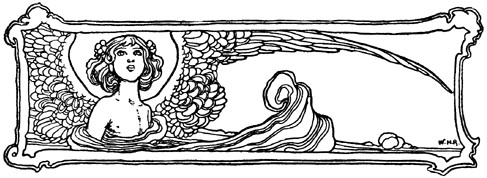

| Frontispiece: “Al Aaraaf.” | |
| PAGE | |
| Title-page. | |
| Contents (headpiece) | vii |
| (Tailpiece) | ix |
| List of Illustrations (headpiece) | xi |
| (Tailpiece) | xiv |
| Introduction (headpiece) | xv |
| (Tailpiece) | xxxii |
| Preface and Dedication of the Volume of 1845 (decorated title) | xxxiii |
| Headpiece to Preface | xxxv |
| Border to Dedication | xxxvii |
| Poems (decorated title) | 1 |
| The Raven (headpiece) | 3 |
| “The night’s plutonian shore” | 8, 9 |
| The Bells (decorated title) | 13 |
| (Headpiece) | 15 |
| “The swinging and the ringing of the bells” | 19 |
| Tailpiece) | 20-xii- |
| Ulalume (frontispiece) | 22 |
| Astarte | 24 |
| “In agony sobbed” | 25 |
| “It was down by the dank tarn of Auber” | 27 |
| Bridal Ballad (headpiece) | 29 |
| Lenore (headpiece) | 30 |
| Lenore | 31 |
| A Valentine (tailpiece) | 34 |
| A Valentine | 35 |
| An Enigma (headpiece) | 37 |
| To Helen (headpiece) | 38 |
| (Tailpiece) | 40 |
| Annabel Lee (headpiece) | 41 |
| For Annie (headpiece) | 42 |
| (Tailpiece) | 45 |
| To F——s S. O——d (headpiece) | 46 |
| To —— —— (tailpiece) | 47 |
| The City in the Sea (headpiece) | 48 |
| (Tailpiece) | 50 |
| “With its Phantom chased for evermore By a crowd that seize it not” |
51 |
| The Conqueror Worm (tailpiece) | 53 |
| The Sleeper (headpiece) | 54 |
| “The lady sleeps” | 55 |
| (Tailpiece) | 56 |
| The Coliseum (headpiece) | 57 |
| “Where an Eidolon, named Night, On a black throne reigns upright” |
58 |
| Eulalie | 62 |
| To my Mother (headpiece) | 63 |
| Eldorado: “He met a pilgrim shadow” | 64 |
| “In search of Eldorado” | 65 |
| To F—— (head- and tailpiece) | 67-xiii- |
| To One in Paradise | 71 |
| Hymn (head- and tailpiece) | 71 |
| A Dream within a Dream (headpiece) | 72 |
| “I stand amid the roar Of a surf-tormented shore” |
73 |
| To Zante (headpiece) | 75 |
| The Haunted Palace (headpiece) | 76 |
| “But evil things, in robes of sorrow, Assailed the monarch’s high estate” |
78, 79 |
| (Tailpiece) | 81 |
| Silence (head-and tailpiece) | 82 |
| Silence | 83 |
| Israfel (headpiece) | 85 |
| Israfel | 87 |
| To M. L. S—— (headpiece) | 89 |
| The Valley of Unrest (headpiece) | 90 |
| Poems written in Youth (decorated title) | 91 |
| To Helen (decorated border) | 93 |
| Sonnet: To Science (headpiece) | 94 |
| Spirits of the Dead (headpiece) | 95 |
| Evening Star (headpiece) | 96 |
| Evening Star | 97 |
| Fairyland (headpiece) | 99 |
| (Tailpiece) | 100 |
| The Lake: To —— (headpiece) | 101 |
| A Dream (headpiece) | 102 |
| A Pæan (headpiece) | 103 |
| The Happiest Day (headpiece) | 105 |
| Alone (headpiece) | 106 |
| Alone | 107 |
| Stanzas (headpiece) | 109 |
| To —— (headpiece) | 110 |
| To the River (headpiece) | 111-xiv- |
| Song (head- and tailpiece) | 112 |
| Dreams (headpiece) | 113 |
| Romance (headpiece) | 114 |
| Tamerlane (decorated title) | 115 |
| (Headpiece) | 117 |
| “On the mountain peak alone” | 123 |
| Timour | 126 |
| Al Aaraaf (decorated title) | 127 |
| (Headpiece to Part I.) | 129 |
| “She ceased—and buried then her burning cheek | |
| Abashed, amid the lilies” | 135 |
| (Headpiece to Part II.) | 136 |
| (Tailpiece) | 143 |
| (Headpiece to Notes) | 144 |
| Scenes from “Politian” (decorated title) | 149 |
| (Headpiece) | 151 |
| “I cannot pray!—My soul is at war with God” | 157 |
| (Tailpiece) | 170 |
| Letter to Mr. —— (headpiece) | 173 |
| (Tailpiece) | 181 |
| The Poetic Principle (frontispiece) | 184 |
| (Headpiece) | 185 |
| The Philosophy of Composition (headpiece) | 211 |
| Finis | 225 |


“A lie,” says an American proverb, “will run from Maine to Mexico while Truth is putting on its boots,” and the memories of few celebrated men have been more freely aspersed or more tardily vindicated than has that of Edgar Allan Poe. No sooner was the breath out of his body than his enemies addressed themselves to the congenial task of bespattering his reputation, and continued to do so, unchecked and almost unchallenged, for many years. Amongst other charges so contemptible as to be unworthy of a moment’s consideration, he was held up to public execration as a confirmed inebriate and denounced as a shameless plagiarist. At this distance of time it is hardly necessary to remark that the former charge was a particularly cruel perversion of the truth, while the latter was entirely without foundation. But it is a well-known axiom that, if only a sufficiency of mud is thrown, some of it is sure to stick; and in consequence Poe was for a long time denied that place on the roll of fame to which his remarkable talents, both as a poet and a romancer, fairly entitled him. The present generation, however, has witnessed a signal reaction in his favour. Thanks to the untiring efforts of several prominent men of letters both in his own country and in England, the darker-xvi- shadows which rested upon his name have been effectually dispersed; the world has gradually come to take a more just view both of his character and his genius; and in this, the closing year of the nineteenth century, we find Poe’s reputation more firmly established than at any time since his untimely death in 1849.
To a right understanding of the works of any author some knowledge of his life is essential, for a man’s writings are always to a greater or less extent the reflection of his character and his surroundings. Of course there are exceptions to this as to other rules. There are authors whose forte lies in describing the passions and the impossibility of controlling them, and who in private life are confirmed misogynists; while there are others, whose most entertaining books have been dictated upon a bed of suffering from which there was little chance of their ever rising again. But Poe was not one of these exceptions: in his writings—and more especially in his poetry—his character is mirrored for all men to behold it.
Naturally of a morbid temperament, Poe’s innate propensity to look upon the dark side of things was strengthened by the circumstances in which he was placed. His life was one of continuous disappointment. He laboured incessantly, and hardly earned enough to keep body and soul together; he was, perhaps, the most original genius of his time, and was accused of pilfering from the work of vastly inferior minds; he was-xvii- intensely ambitious, and remained a literary hack to the end of his days; he was of a most affectionate disposition, and was compelled to witness the one whom he loved best upon earth in the grip of a cruel and lingering disease, without possessing the means of procuring her the comforts which might have alleviated her sufferings. Knowing all this, can we wonder at the tone of settled melancholy which pervades his poetry—the regret for what might have been, the yearning for what can never be? Here and there, it is true, he strikes a different note, as in “Eulalie” and the charming little lyric “To Helen,” which latter poem, however, was written when he was still a boy; but these variations, like glimpses of blue sky on a dark and lowering horizon, only serve to intensify the general gloom. And yet, in spite of their sadness, there is a pathetic sweetness in his verses, which appeals irresistibly to the heart, and makes the reader fain to admit that in his particular strain Poe is indeed a master.
Born at Boston on January 19th, 1809—the son of one David Poe, a man of good family, who had married an actress and subsequently adopted his wife’s profession—Edgar Allan Poe had the misfortune to lose both his parents in infancy, after which he was adopted by his godfather, Mr. John Allan, a wealthy and childless Richmond merchant, with the intention, it is thought, of making him his heir. The boy was handsome, witty, and precocious, and was-xviii- petted and indulged by his adopted father to his heart’s content; indeed, it is to the injudicious treatment which he then received that Poe himself ascribes many of the difficulties which beset his path in after life.
When eight years old he was brought to England and placed at a school at Stoke Newington kept by a Dr. Bransby, who is amusingly depicted in “William Wilson,” one of Poe’s finest stories. Here he remained five years, when he returned to America, and after studying until he was seventeen at a Richmond academy, matriculated at the University of Virginia, at Charlottesville. At the University he seems to have acquired some reputation as a scholar; but at the end of his first session a difference of opinion with his godfather in respect of some gambling debts, which the old gentlemen very properly refused to pay, led to an open quarrel, and Poe, instead of returning to Charlottesville, set out for Europe, with the intention of assisting the Greeks, then struggling to free themselves from the intolerable yoke of Turkey. It does not appear, however, that he took any part in the war, nor even beheld, except in his mind’s eye, the remains of “the glory that was Greece.” After wandering about the Continent for a couple of years he returned home, became reconciled to Mr. Allan, and, having expressed a wish to enter the army, was accordingly nominated to a cadetship at West Point. But, alas, the “Imp of the Perverse”-xix- was ever at his heels, and in less than twelve months he was cashiered “for various neglects of duty and disobedience of orders.”
The loss of his profession—no great matter in itself, for anyone less fitted for the strict discipline of a military life it would be difficult to imagine—was followed by another and far more serious quarrel with his adopted father, with the result that the young man found himself thrown upon his own resources. He had already published a small volume of poems—those comprised in his last collection as “Poems written in Youth”—which included the delightful stanzas beginning “Helen, thy beauty is to me,” and he now determined to turn to literature for a livelihood. Nothing is known of his career for the next two years; but in 1833 with a tale, “A MS. found in a Bottle,” and a poem, “The Coliseum,” he carried off two prizes offered for competition by a Baltimore newspaper, and having attracted the notice of one of the judges—Mr. John Kennedy, a well-known literary man—he obtained through his influence employment on “The Southern Literary Messenger,” at Richmond.
Henceforth, until his death, Poe was intimately connected with American journalism, and more than one moribund periodical was indebted to his eloquent pen for a fresh lease of life. He was an indefatigable worker, pouring forth poems, essays, stories, and reviews with feverish energy; and, at the same time, so fas-xx-tidious that he never permitted a manuscript to leave his hands until he was satisfied that he had given the public of his very best. Unfortunately in America in those days literary work was very inadequately remunerated, while copyright was a mere farce; so that even for his finest poems and his most powerful tales Poe never received more than fifty or sixty dollars, and generally very much less, and was in consequence seldom free from pecuniary embarrassment. “The Raven,” which appeared in 1845 in Cotton’s “American Review,” brought him immediate fame, and—ten dollars; and while his poem was being read, and recited, and parodied all over the English-speaking world, the author was actually in want of the common necessaries of life. To add to his troubles, his wife, Virginia Clemm, a beautiful and charming girl whom he had married in 1836, and to whom he was most devotedly attached, had soon after their marriage contracted a fatal malady, and was slowly fading away before his eyes; and his anxiety on her behalf thoroughly unnerved him and weakened his power of self-restraint, never at any time very great. It was this, combined with ill-health and the strain of overwork, which drove him to the use of the stimulants which ultimately proved his ruin; but the statement that he habitually drank to excess was a malicious fabrication. The fact was that poor Poe, in common with many other people of a nervous, highly-strung tempera-xxi-ment, was, as one of his most intimate friends assures us, unable to take “even a single glass of wine” with impunity.
Mrs. Poe died in 1847, and in the autumn of the following year Poe became engaged to a widow, named Mrs. Whitman, a lady of considerable literary attainments. This engagement, from which his friends hoped much, was unfortunately soon broken off, for reasons which have never been satisfactorily explained, and on October 7th, 1849, the poet died under painful circumstances at Baltimore.
It is frequently asserted that Poe is a single-poem poet—that he is indebted for the niche he now occupies in the Temple of Song mainly to his wonderful poem “The Raven”; and that if “The Raven” had never been written, Poe would now be remembered merely as a skilful weaver of sensational romances, who wrote passable, if somewhat fantastic, verses in his leisure moments. But those who hold this opinion not only do Poe a grave injustice, but admit themselves incapable of appreciating some of the very finest lyrics in the English language. “The Raven,” it is true, is the poem whose artificial qualities appeal most strongly to the fancy of the general reader, and for this reason, if for no other, is entitled to all due respect from the critic; but remarkable as it undoubtedly is, it is open to question whether, considered purely as a poem, it is quite on the same plane with that masterpiece of imagina-xxii-tion “The City in the Sea,” the mystical town where “Death has reared himself a throne,” or with that exquisite lyric “The Sleeper,” in which Poe’s inimitable power as a word-painter rises to such a height that we almost seem to see the beautiful dead woman lying pale and still in her “length of tress” waiting to exchange her death-chamber
Again, if neither “The Raven” nor either of the two poems we have just mentioned had been given to the world, such productions as “The Haunted Palace,” “Annabel Lee,” and “To Helen,” to say nothing of “Israfel,” “Ulalume,” and “The Bells,” containing as they do passages of the rarest charm, would surely have sufficed to keep their author’s memory green for all time. What can one possibly desire finer of their kind than those lines from that splendid piece of verbal music, “The Haunted Palace,” which no lover of Poe can resist quoting?—
However, although, as we have said, “The-xxiii- Raven” is, in its poetical constituents, probably inferior to some of Poe’s other poems, yet it is in the mind of the average reader so inseparably connected with its author’s claim to rank among
that it may not be out of place to say something about the way in which it came to be written. And first let us remark that the impression that still very generally prevails that “The Raven” was inspired by the death of the poet’s wife—that she is the “Lost Lenore” of the poem—is altogether erroneous, inasmuch as Virginia Poe’s death did not take place until January, 1847, while “The Raven” was first published in February, 1845—nearly two years earlier.
Poe himself, in his essay “The Philosophy of Composition,” in which he treats us to a very elaborate analysis of the methods employed in writing this poem, while ridiculing the suggestion that it was the offspring of any sudden impulse—of “any species of fine frenzy” under the influence of which poets are popularly believed to compose their masterpieces—does not admit that he is indebted for either the rhythm or the idea of “The Raven” to any extraneous sources. Several of his critics, however, regard this essay as not the least imaginative of his writings, and even hint that-xxiv- it is nothing more or less than an ingenious attempt to throw dust in the eyes of a too inquisitive public. One of the ablest and most discriminating of Poe’s critics, Mr. Stedman, in the admirable essay which is prefaced to Gustave Doré’s illustrations of this poem, while not going so far as this, is of the opinion that the rhythm of “The Raven” was suggested by Mrs. Browning’s (then Elizabeth Barrett) charming poem “Lady Geraldine’s Courtship,” in proof of which he points out a very remarkable similarity between certain verses in the two poems. Thus in Mrs. Browning’s poem we have:
While in “The Raven” we find:
The fact that it was very largely due to the influence of Poe that Mrs. Browning’s works received such a favourable reception in America (she was a frequent contributor to “Graham’s Magazine” while it was edited by him); that he always professed the most intense admiration both for her genius and her lyrical methods; and that he subsequently dedicated to her, as-xxv- “the noblest of her sex,” “The Raven and Other Poems,” would certainly seem to lend colour to this suggestion. Mr. Stedman, it may be added, does not insinuate that there is anything in this similarity which can possibly be construed into an act of plagiarism on the part of the American writer; indeed, the whole motive of the two poems—the one a love-story pure and simple with an ideal ending; the other a weird, fantastic creation, breathing an atmosphere of doubt and despair, of desires unfulfilled and hope abandoned—is altogether different.
Another theory, propounded by Mr. Ingram, who has, perhaps, done more than anyone to vindicate the memory of Poe from the calumnies of his soi-disant biographer, Griswold, is that the inspiration of “The Raven” is to be found in a poem called “Isidore,” which was contributed by Albert Pike, the Arkansas poet, to “The New Mirror,” at a time when Poe was writing for the same journal. In this poem a bird “whose song enhances depression”—a mocking-bird to wit—also figures, while the refrain is not unlike that of “The Raven.” However, even if we are prepared to admit that “The Raven” is not so entirely the fruit of its author’s imagination as was at first supposed, this fact does not sensibly detract from the merits of a work which must always retain its place amongst the masterpieces of English verse.-xxvi-
Poe then, as we have endeavoured to show, is very far from being a single-poem poet; but, on the other hand, he is undoubtedly the poet of a single mood—a mood which by no stretch of the imagination can be called a pleasing one in the ordinary acceptation of the term, but withal so striking and so original as to command—nay, even to compel—the reader’s attention. Poe does not sing of “emerald fields” and “ambient streams,” like Wordsworth; of wide, rolling prairies and dense forests of murmuring pines, like Longfellow; of “stainless knights” and “lily maids,” like Tennyson; nor of love both within and without the limits of the conscience, like Byron. No, his theme is a widely different one from all these. As with his prose romances so with his poetry. Just as in his romances he concerns himself in the main with subjects which most writers of fiction leave severely alone—with death in strange and awful forms; with the horrors of insanity and remorse; with men who under mesmeric influences continue to speak long after the King of Terrors has laid his icy finger upon them; with others who are prematurely buried, and who explore the secrets of the charnel-house—in a word, with what his friend honest John Kennedy called “the terrific”: so in his poetry his song is of phantom cities sinking into fathomless seas; of demon shapes flitting through enchanted palaces; of ghoul-haunted tarns; of “sheeted memories of-xxvii- the past”; of loved ones who have been taken from us, and of the utter hopelessness of reunion with them in “the distant Aidenn.” Sadness, as we have said elsewhere, is the dominant note of all his poetry; but sadness, as he himself tells us in his “Philosophy of Composition,” was his conception of the highest tone of Beauty, and therefore the most legitimate of all the poetical tones. Thus we understand why it is that the death of a beautiful woman—the saddest of all losses—forms the burden of so many of his finest lyrics. How different is all this from Shelley, who defines poetry as what redeems from decay the visitations of the divinity in man, and is the record of the best and happiest moments of the best and happiest minds; and yet Poe in his earlier efforts, such as “Tamerlane” and “Al Aaraaf,” was obviously the disciple of Shelley!
As we read these wonderful poems we are alternately repelled and attracted; still, strive as we may, we cannot escape the spell of those weird, mystic measures. When once we begin a poem, whether it be “The Raven,” “The City in the Sea,” or even “The Conqueror Worm,” we are compelled, in spite of ourselves, to read on to the end; and when the end is reached, it is not seldom with a sigh of regret that we close the book.
Poe confined himself almost entirely to simple ballad forms—which is the case even in poems like “Ulalume” and “The Bells,” where the-xxviii- measures certainly seem at first sight to be somewhat intricate—and relied for his effect upon the melody. With him everything was subordinate to sound. Here and there, as in “Ulalume,” it must be admitted that, in striving to please the ear, he approaches perilously near the point where “sense swoons into nonsense”; but, on the whole, as a melodist he achieved wonders, and no poet has used the refrain and the repetend in quite the same way or so effectively. What, for instance, in “The Bells” could possibly be more telling than the constant repetition of the word which gives its name to the poem? The repetend, his free use of which did so much for the success of “The Raven,” he employed even more lavishly in some of his later poems, such as “Lenore,” “Annabel Lee,” “Ulalume,” and “For Annie,” and with the happiest results. Thus:
And again:
In the management of his metres, too, Poe stands almost without a rival. Unlike the majority of poets, who, in determining the length of a poem, are guided by the sense rather than-xxix- by the sound, he regarded the melody as of equal if not of primary importance, and one famous critic has declared that “it would be impossible to omit a line or stanza without injuring the metrical as well as the intelligible effect.”
Regret is often expressed that—with the single exception of “Al Aaraaf,” which, however, was written when his intellect was still in its adolescent stage, and has done comparatively little to enhance his reputation—Poe, almost alone among the great poets of the nineteenth century, should never have given us a poem of any considerable length. But as a journalistic hack, forced to write by the column for his daily bread, Poe had but scant leisure for the composition of a “Childe Harold,” an “Endymion,” or a “Hiawatha,” and, moreover, it is extremely doubtful whether, even if the range of his possibilities had not been limited by his poverty, he would have done so, as he seems to have had a most profound contempt for prolixity in poetry. In his essay, “The Poetic Principle,” he maintains that “the phrase ‘a long poem’ is simply a flat contradiction in terms,”—that a poem deserves its title only inasmuch as it excites by elevating the soul; and that, as all such emotions are, by a psychical necessity, transient, it is obviously impossible for the necessary degree of excitement to be maintained throughout a composition of any great length. “After the lapse of half an hour at the very-xxx- utmost,” he says, “it flags—fails—a revulsion ensues—and then the poem is, in effect and in fact, no longer such.” This theory of Poe’s gave rise to much hostile criticism, and justly so; still, it cannot be doubted that the time-honoured notion that no poem can be termed great that is not a long one, and no poet worthy of the name who has not written a long poem, has deprived the world of much fine lyric poetry by compelling able men to expend their time and energy in the production of bulky epics, for which in many cases their genius was but ill-adapted, instead of confining themselves to the lighter forms of verse. While thus condemning prolixity, however, Poe does not deny that a poem may be “improperly brief,” and thus “degenerate into mere epigrammatism”; and that “a very short poem,” however great its intrinsic merits may be, can never hope to produce a profound or a lasting effect. He mentions Shelley’s exquisite “Lines to an Indian Air,” and his own friend Willis’s pathetic ballad, “Unseen Spirits,” as instances of poems which had failed to receive adequate recognition by reason of undue brevity.
The secret of Poe’s hostility to the long poem is probably to be found in the fact that he had the strongest possible aversion to the introduction of metaphysics into poetry, which he regarded as the “child of Taste,” whose sole function ought to be “the rhythmical creation of Beauty”; and the long poem had to a very-xxxi- large extent become identified with the Didactic school of poets, of which Wordsworth was the principal exponent.
Poe was not the first to raise a protest against what he termed “the heresy of the Didactic.” Years before, Keats had declared that “people hated poetry that had a palpable design upon them,” and that “poetry should be great and unobtrusive.” Poe, however, went very much farther than the author of “Endymion” would have been likely to accompany him, for he maintains that “poetry has only collateral relations with the intellect and the conscience, and, unless incidentally, no concern whatever with either duty or truth.” To anyone who has even a superficial acquaintance with the great masters of verse the fallacy of such a proposition is obvious. Without the conception of duty and of truth, from which spring noble passions and great deeds—religious enthusiasm, love of humanity, love of liberty, self-sacrifice, loyalty, and patriotism—we should have had no Æschylus, no Sophocles, no Euripides, no Homer, no Shakespeare, no Milton, and no Tennyson—which reflection may enable us to bear with comparative equanimity the platitudes of the latter-day poet.
What Poe might have done or have left undone, had not “unmerciful Disaster” dogged his footsteps, and carried him off, as it had carried off Burns, and Keats, and Shelley, and Byron, and many another child of genius, before he-xxxii- had reached the meridian of his days, it were idle to speculate; but this much is certain—that, when the works of far greater poets have fallen into neglect, Poe will still be read and still appreciated, for, in the domain which he made so peculiarly his own, it is hardly possible to imagine that he will ever have to encounter anything approaching serious rivalry, while the feelings which he appeals to are universal.
Noel Williams.
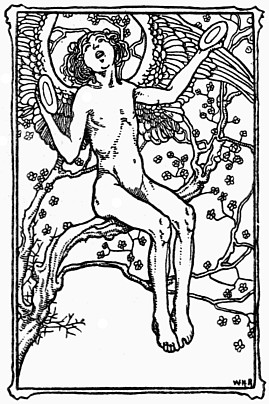


These trifles are collected and republished chiefly with a view to their redemption from the many improvements to which they have been subjected while going at random the “rounds of the press.” I am naturally anxious that what I have written should circulate as I wrote it, if it circulate at all. In defence of my own taste, nevertheless, it is incumbent upon me to say that I think nothing in this volume of much value to the public, or very creditable to myself. Events not to be controlled have prevented me from making, at any time, any serious effort in what, under happier circumstances, would have been the field of my choice. With me poetry has been not a purpose, but a passion; and the passions should be held in reverence: they must not—they cannot at will be excited, with an eye to the paltry compensations, or the more paltry commendations, of mankind.
E. A. P.
1845.
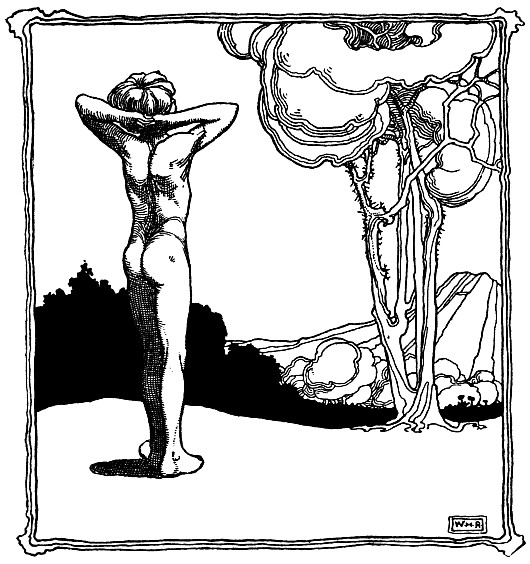

TO
THE NOBLEST OF HER SEX—
TO THE AUTHOR OF
“THE DRAMA OF EXILE”—
TO
MISS ELIZABETH BARRETT BARRETT,
OF ENGLAND,
I DEDICATE THIS VOLUME
WITH THE MOST ENTHUSIASTIC ADMIRATION AND
WITH THE MOST SINCERE ESTEEM.
E. A. P.



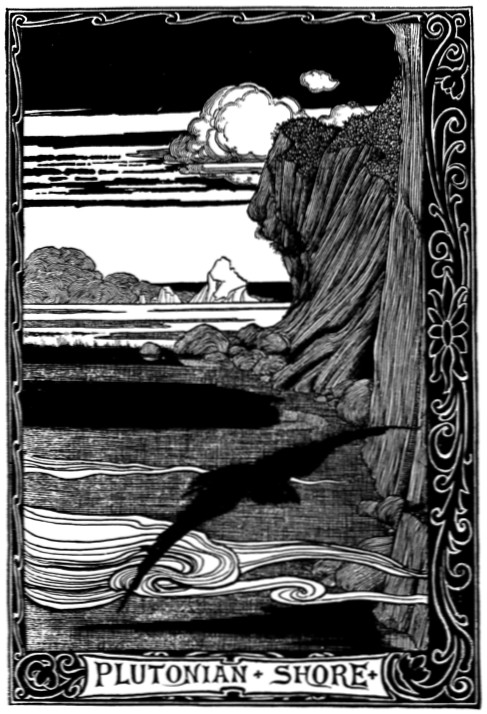



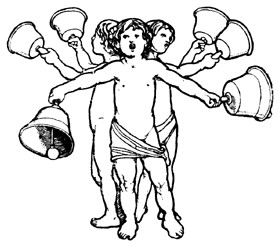



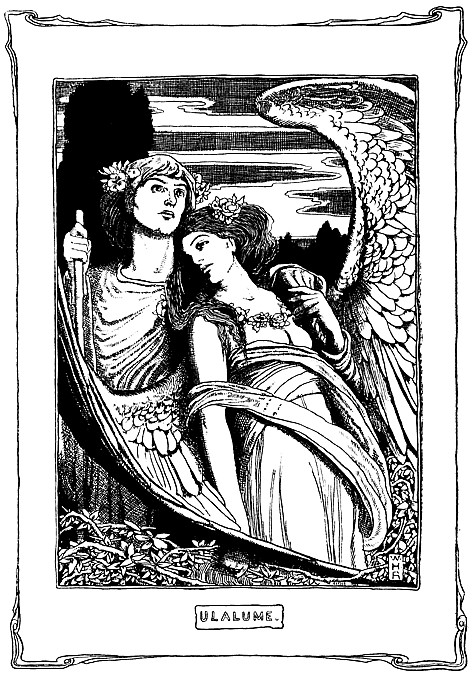

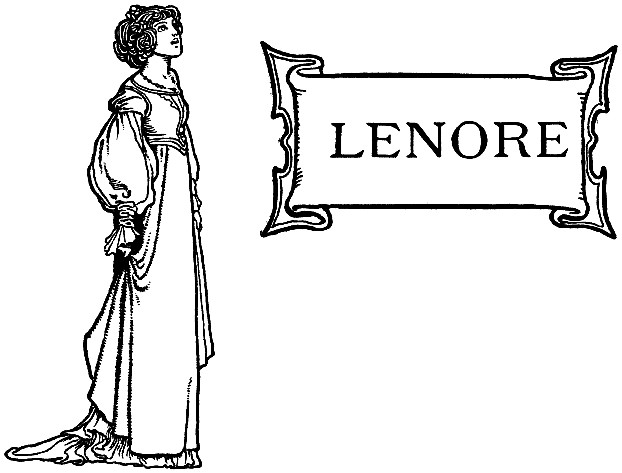
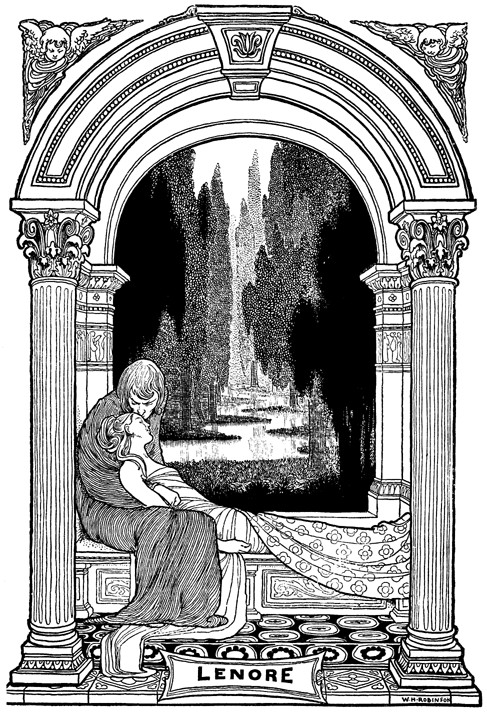
[To find the name, read the first letter of the first line in connection with the second letter of the second line, the third letter of the third line, the fourth of the fourth, and so on to the end.]



[To find the name, read as in the preceding poem.]










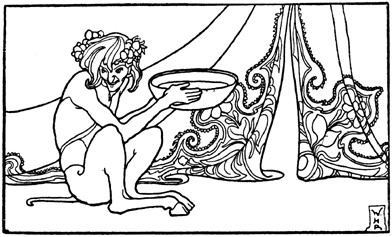


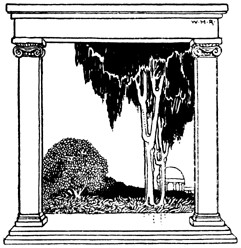




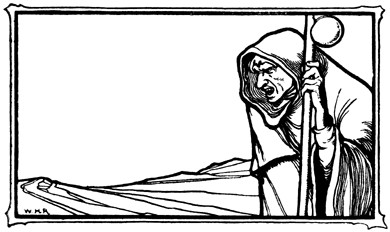


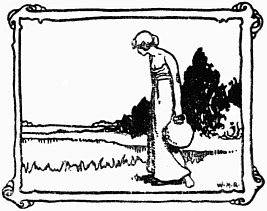



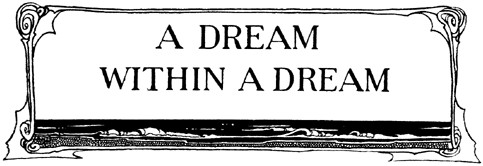







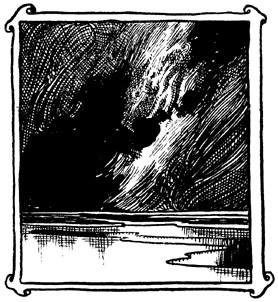
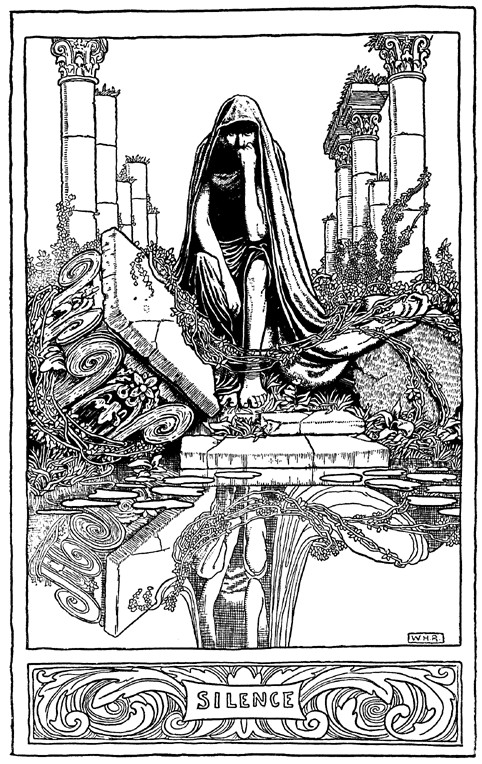

And the angel Israfel, whose heart-strings are a lute, and who has the sweetest voice of all God’s creatures.—Koran.




Private reasons—some of which have reference to the sin of plagiarism, and others to the date of Tennyson’s first poems—have induced me, after some hesitation, to republish these, the crude compositions of my earliest boyhood. They are printed verbatim—without alteration from the original edition—the date of which is too remote to be judiciously acknowledged.—E. A. P.




















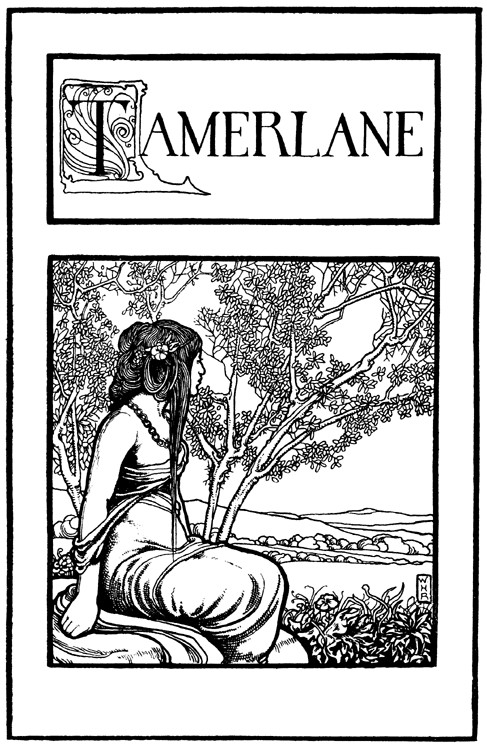

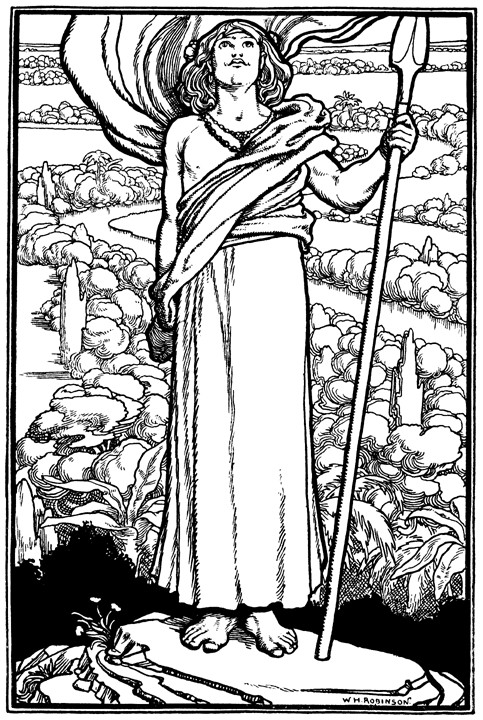
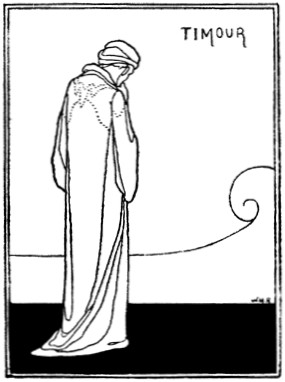
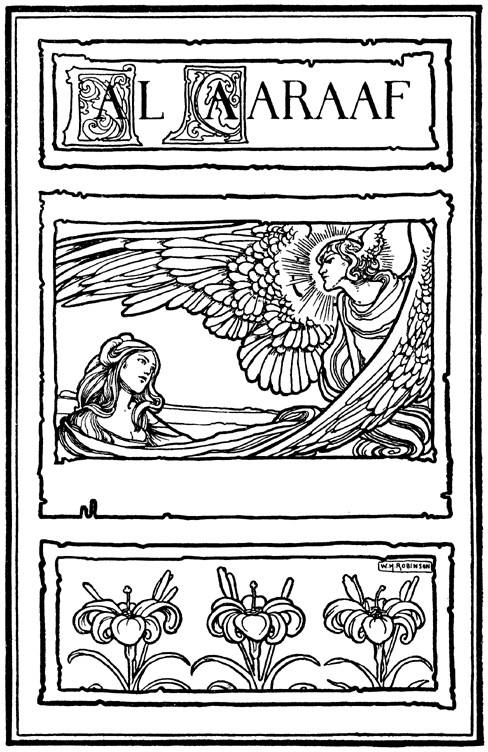
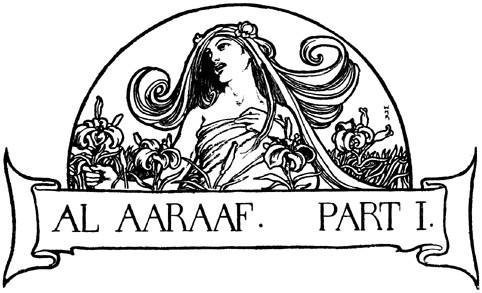
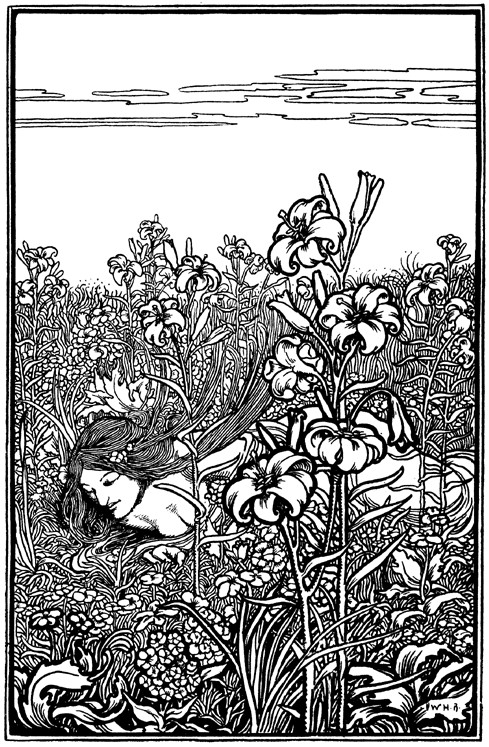

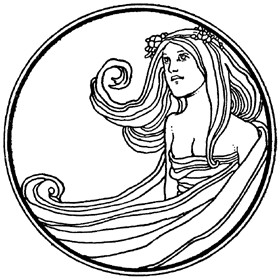
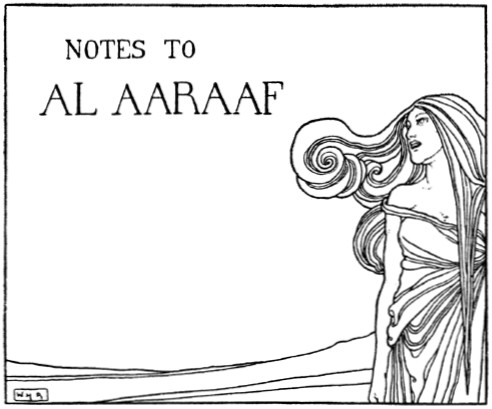
Page 129. Al Aaraaf. A star was discovered by Tycho Brahe which appeared suddenly in the heavens—attained, in a few days, a brilliancy surpassing that of Jupiter—then as suddenly disappeared, and has never been seen since.
Page 130. Capo Deucato. On Santa Maura—olim Deucadia.
Page 130. Her who loved a mortal—and so died. Sappho.
Page 130. And gemmy flower, of Trebizond misnamed. This flower is much noticed by Lewenhoeck and Tournefort. The bee, feeding upon its blossom, becomes intoxicated.
Page 131. Clytia. Clytia—the Chrysanthemum Peruvianum, or, to employ a better-known term, the turnsol—which turns continually towards the sun, covers itself, like Peru, the country from which it comes, with dewy clouds, which cool and refresh its flowers during the most violent heat of the day.—B. de St. Pierre.
Page 131. That aspiring flower that sprang on Earth. There is cultivated in the king’s garden at Paris, a species of serpentine aloe without prickles, whose large and beautiful flower exhales a strong odour of the vanilla, during the time of its expansion, which is very short. It does not blow till towards the month of July—you then perceive it gradually open its petals—expand them—fade and die.—St. Pierre.-145-
Page 131. Valisnerian lotus. There is found, in the Rhone, a beautiful lily of the Valisnerian kind. Its stem will stretch to the length of three or four feet—thus preserving its head above water in the swellings of the river.
Page 131. Thy most lovely purple perfume. The Hyacinth.
Page 131. The Nelumbo bud. It is a fiction of the Indians, that Cupid was first seen floating in one of these down the river Ganges, and that he still loves the cradle of his childhood.
Page 131. To bear the Goddess’ song, etc. And golden vials full of odours which are the prayers of the saints.—Rev. St. John.
Page 132. A model of their own. The Humanitarians held that God was to be understood as having really a human form.—Vide Clarke’s Sermons, vol. i., page 26, fol. edit.
The drift of Milton’s argument leads him to employ language which would appear, at first sight, to verge upon their doctrine; but it will be seen immediately, that he guards himself against the charge of having adopted one of the most ignorant errors of the dark ages of the Church.—Dr. Sumner’s Notes on Milton’s Christian Doctrine.
This opinion, in spite of many testimonies to the contrary, could never have been very general. Andeus, a Syrian of Mesopotamia, was condemned for the opinion, as heretical. He lived in the beginning of the fourth century. His disciples were called Anthropomorphites.—Vide du Pin.
Among Milton’s minor poems are these lines:
And afterwards—
Page 132. Wingèd Fantasy.
Page 135. Sightless cycles. Sightless—too small to be seen.—Legge.
Page 135. Fire-flies. I have often noticed a peculiar movement of the fire-flies;—they will collect in a body and fly off, from a common centre, into innumerable radii.-146-
Page 135. Therasæan reign. Therasæa, or Therasea, the island mentioned by Seneca, which, in a moment, arose from the sea to the eyes of astonished mariners.
Page 136. Molten stars, etc.
Page 137. Persepolis. Voltaire, in speaking of Persepolis, says, “Je connois bien l’admiration qu’inspirent ces ruines—mais un palais érigé au pied d’une chaîne des rochers sterils—peut il être un chef d’œuvre des arts?”
Page 137. Gomorrah. Ula Deguisi is the Turkish appellation; but, on its own shores, it is called Bahar Loth, or Almotanah. There were undoubtedly more than two cities engulphed in the “dead sea.” In the valley of Siddim were five—Adrah, Zeboin, Zoar, Sodom and Gomorrah. Stephen of Byzantium mentions eight, and Strabo thirteen (engulfed)—but the last is out of all reason.
It is said [Tacitus, Strabo, Josephus, Daniel of St. Saba, Nau, Maundrell, Troilo, D’Arvieux], that after an excessive drought, the vestiges of columns, walls, etc., are seen above the surface. At any season, such remains may be discovered by looking down into the transparent lake, and at such distances as would argue the existence of many settlements in the space now usurped by the “Asphaltites.”
Page 137. Eyraco. Chaldea.
Page 137. Palpable and loud. I have often thought I could distinctly hear the sound of the darkness as it stole over the horizon.
Page 137. Young flowers were whispering, etc. Fairies use flowers for their charactery.—Merry Wives of Windsor.
Page 138. The moonbeam. In Scripture is this passage—“The sun shall not harm thee by day, nor the moon by night.” It is, perhaps, not generally known that the moon, in Egypt, has the effect of producing blindness to those who sleep with the face exposed to its rays, to which circumstance the passage evidently alludes.
Page 139. The lone Albatross. The Albatross is said to sleep on the wing.
Page 139. The murmur that springs, etc. I met with this idea in an old English tale, which I am now unable to obtain and quote from memory:—“The verie essence and, as it were, springe-heade and origine of all musiche is the verie pleasaunte sounde which the trees of the forest do make when they growe.”-147-
Page 140. Have slept with the bee. The wild bee will not sleep in the shade if there be moonlight.
The rhyme in this verse, as in one about sixty lines before, has an appearance of affectation. It is, however, imitated from Sir W. Scott, or rather from Claud Halcro—in whose mouth I admired its effect:
Page 141. Apart from Heaven’s Eternity—and yet how far from Hell. With the Arabians there is a medium between Heaven and Hell, where men suffer no punishment, but yet do not attain that tranquil and even happiness which they suppose to be characteristic of heavenly enjoyment.
Sorrow is not excluded from “Al Aaraaf,” but it is that sorrow which the living love to cherish for the dead, and which, in some minds, resembles the delirium of opium. The passionate excitement of Love and the buoyancy of spirit attendant upon intoxication are its less holy pleasures—the price of which, to those souls who make choice of “Al Aaraaf” as their residence after life, is final death and annihilation.
Page 141. Tears of perfect moan.
Page 142. The Parthenon. It was entire in 1687—the most elevated spot in Athens.
Page 142. More beauty clung, etc.
Page 142. My pennoned spirit. Pennon, for pinion.—Milton.


ROME.—A Hall in a Palace. Alessandra and Castiglione.
Alessandra. Thou art sad, Castiglione.
Castiglione. Sad!—not I.
Oh, I’m the happiest, happiest man in Rome!
A few days more, thou knowest, my Alessandra,
Will make thee mine. Oh, I am very happy!
Aless. Methinks thou hast a singular way of showing
Thy happiness—what ails thee, cousin of mine?
Why didst thou sigh so deeply?
Cas. Did I sigh?
I was not conscious of it. It is a fashion,
A silly—a most silly fashion I have
When I am very happy. Did I sigh? (sighing.)
Aless. Thou didst. Thou art not well. Thou hast indulged-152-
Too much of late, and I am vexed to see it.
Late hours and wine, Castiglione,—these
Will ruin thee! thou art already altered—
Thy looks are haggard—nothing so wears away
The constitution as late hours and wine.
Cas. (musing). Nothing, fair cousin, nothing—not even deep sorrow—
Wears it away like evil hours and wine.
I will amend.
Aless. Do it! I would have thee drop
Thy riotous company, too—fellows low born;
Ill suit the like with old Di Broglio’s heir
And Alessandra’s husband.
Cas. I will drop them.
Aless. Thou wilt—thou must. Attend thou also more
To thy dress and equipage—they are over plain
For thy lofty rank and fashion—much depends
Upon appearances.
Cas. I’ll see to it.
Aless. Then see to it!—pay more attention, sir,
To a becoming carriage—much thou wantest
In dignity.
Cas. Much, much, oh, much I want
In proper dignity.
Aless. (haughtily). Thou mockest me, sir!
Cas. (abstractedly). Sweet, gentle Lalage!
Aless. Heard I aright?
I speak to him—he speaks of Lalage!
Sir Count! (places her hand on his shoulder) what art thou dreaming? He’s not well!
What ails thee, sir?
Cas. (starting). Cousin! fair cousin!—madam!
I crave thy pardon—indeed I am not well—
Your hand from off my shoulder, if you please.
This air is most oppressive!—Madam—the Duke!
Enter Di Broglio.
Di Broglio. My son, I’ve news for thee!—hey?—what’s the matter? (observing Alessandra.)
I’ the pouts? Kiss her, Castiglione! kiss her,
You dog! and make it up, I say, this minute!
I’ve news for you both. Politian is expected
Hourly in Rome—Politian, Earl of Leicester!
We’ll have him at the wedding. ’Tis his first visit
To the imperial city.
Aless. What! Politian
Of Britain, Earl of Leicester?
Di Brog. The same, my love.
We’ll have him at the wedding. A man quite young
In years, but grey in fame. I have not seen him
But rumour speaks of him as of a prodigy
Pre-eminent in arts, and arms, and wealth,
And high descent. We’ll have him at the wedding.
Aless. I have heard much of this Politian.
Gay, volatile and giddy—is he not,
And little given to thinking?
Di Brog. Far from it, love.
No branch, they say, of all philosophy
So deep abstruse he has not mastered it.
Learnèd as few are learnèd.
Aless. ’Tis very strange!
I have known men have seen Politian
And sought his company. They speak of him
As of one who entered madly into life,
Drinking the cup of pleasure to the dregs.
Cas. Ridiculous! Now I have seen Politian
And know him well—nor learned nor mirthful he.
He is a dreamer, and a man shut out
From common passions.
Di Brog. Children, we disagree.
Let us go forth and taste the fragrant air-154-
Of the garden. Did I dream, or did I hear
Politian was a melancholy man? (Exeunt.)
ROME.—A Lady’s Apartment, with a window open and looking into a garden. Lalage, in deep mourning, reading at a table on which lie some books and a hand-mirror. In the background Jacinta (a servant maid) leans carelessly upon a chair.
Lalage. Jacinta! is it thou?
Jacinta (pertly). Yes, ma’am, I’m here.
Lal. I did not know, Jacinta, you were in waiting.
Sit down!—let not my presence trouble you—
Sit down!—for I am humble, most humble.
Jac. (aside). ’Tis time.
(Jacinta seats herself in a side-long manner upon the chair, resting her elbows upon the back, and regarding her mistress with a contemptuous look. Lalage continues to read.)
Lal. “It in another climate, so he said,
Bore a bright golden flower, but not i’ this soil!”
(pauses—turns over some leaves, and resumes.)
“No lingering winters there, nor snow, nor shower—
But Ocean ever to refresh mankind
Breathes the shrill spirit of the western wind.”
Oh, beautiful!—most beautiful!—how like
To what my fevered soul doth dream of Heaven!
O happy land! (pauses) She died!—the maiden died!
O still more happy maiden who couldst die!
Jacinta!
(Jacinta returns no answer, and Lalage presently resumes.)
Again!—a similar tale
Told of a beauteous dame beyond the sea!-155-
Thus speaketh one Ferdinand in the words of the play—
“She died full young”—one Bossola answers him—
“I think not so—her infelicity
Seemed to have years too many”—Ah, luckless lady!
Jacinta! (still no answer).
Here’s a far sterner story—
But like—oh, very like in its despair—
Of that Egyptian queen, winning so easily
A thousand hearts—losing at length her own.
She died. Thus endeth the history—and her maids
Lean over her and weep—two gentle maids
With gentle names—Eiros and Charmion!
Rainbow and Dove!—Jacinta!
Jac. (pettishly). Madam, what is it?
Lal. Wilt thou, my good Jacinta, be so kind
As go down in the library and bring me
The Holy Evangelists?
Jac. Pshaw! (Exit.)
Lal. If there be balm
For the wounded spirit in Gilead, it is there!
Dew in the night time of my bitter trouble
Will there be found—“dew sweeter far than that
Which hangs like chains of pearl on Hermon hill.”
(re-enter Jacinta, and throws a volume on the table.)
Jac. There, ma’am, ’s the book. (aside.) Indeed she is very troublesome.
Lal. (astonished). What didst thou say, Jacinta? Have I done aught
To grieve thee or to vex thee?—I am sorry.
For thou hast served me long and ever been
Trustworthy and respectful. (resumes her reading.)
Jac. (aside.) I can’t believe
She has any more jewels—no—no—she gave me all.
Lal. What didst thou say, Jacinta? Now I bethink me-156-
Thou hast not spoken lately of thy wedding.
How fares good Ugo?—and when is it to be?
Can I do aught?—is there no further aid
Thou needest, Jacinta?
Jac. (aside.) Is there no further aid?
That’s meant for me. (aloud.) I’m sure, madam, you need not
Be always throwing those jewels in my teeth.
Lal. Jewels! Jacinta,—now indeed, Jacinta,
I thought not of the jewels.
Jac. Oh, perhaps not!
But then I might have sworn it. After all,
There’s Ugo says the ring is only paste,
For he’s sure the Count Castiglione never
Would have given a real diamond to such as you;
And at the best I’m certain, madam, you cannot
Have use for jewels now. But I might have sworn it. (Exit.)
(Lalage bursts into tears and leans her head upon the table—after a short pause raises it.)
Lal. Poor Lalage!—and is it come to this?
Thy servant maid!—but courage!—’tis but a viper
Whom thou hast cherished to sting thee to the soul! (taking up the mirror.)
Ha! here at least’s a friend—too much a friend
In earlier days—a friend will not deceive thee.
Fair mirror and true! now tell me (for thou canst)
A tale—a pretty tale—and heed thou not
Though it be rife with woe. It answers me.
It speaks of sunken eyes, and wasted cheeks,
And Beauty long deceased—remembers me,
Of Joy departed—Hope, the Seraph Hope,
Inurnèd and entombed!—now, in a tone
Low, sad, and solemn, but most audible,
Whispers of early grave untimely yawning
For ruined maid. Fair mirror and true!—thou liest not!-157-
Thou hast no end to gain—no heart to break—
Castiglione lied who said he loved——
Thou true—he false!—false!—false!

(While she speaks, a monk enters her apartment and approaches unobserved.)
Monk. Refuge thou hast,
Sweet daughter! in Heaven. Think of eternal things!
Give up thy soul to penitence, and pray!
Lal. (arising hurriedly). I cannot pray!—My soul is at war with God!
The frightful sounds of merriment below
Disturb my senses—go! I cannot pray—-158-
The sweet airs from the garden worry me!
Thy presence grieves me—go!—thy priestly raiment
Fills me with dread—thy ebony crucifix
With horror and awe!
Monk. Think of thy precious soul!
Lal. Think of my early days!—think of my father
And mother in Heaven! think of our quiet home,
And the rivulet that ran before the door!
Think of my little sisters!—think of them!
And think of me!—think of my trusting love
And confidence—his vows—my ruin—think—think
Of my unspeakable misery!——begone!
Yet stay! yet stay!—what was it thou saidst of prayer
And penitence? Didst thou not speak of faith
And vows before the throne?
Monk. I did.
Lal. ’Tis well.
There is a vow ’twere fitting should be made—
A sacred vow, imperative and urgent,
A solemn vow!
Monk. Daughter, this zeal is well!
Lal. Father, this zeal is anything but well!
Hast thou a crucifix fit for this thing?
A crucifix whereon to register
This sacred vow? (he hands her his own.)
Not that—Oh! no!—no!—no! (shuddering.)
Not that! Not that!—I tell thee, holy man,
Thy raiments and thy ebony cross affright me!
Stand back! I have a crucifix myself,—
I have a crucifix! Methinks ’twere fitting
The deed—the vow—the symbol of the deed—
And the deed’s register should tally, father!
(draws a cross-handled dagger and raises it on high.)
Behold the cross wherewith a vow like mine
Is written in Heaven!
Monk. Thy words are madness, daughter,-159-
And speak a purpose unholy—thy lips are livid—
Thine eyes are wild—tempt not the wrath divine!
Pause ere too late!—oh, be not—be not rash!
Swear not the oath—oh, swear it not!
Lal. ’Tis sworn!
An Apartment in a Palace. Politian and Baldazzar.
Baldazzar. Arouse thee now, Politian!
Thou must not—nay indeed, indeed, thou shalt not
Give way unto these humours. Be thyself!
Shake off the idle fancies that beset thee,
And live, for now thou diest!
Politian. Not so, Baldazzar!
Surely I live.
Bal. Politian, it doth grieve me
To see thee thus!
Pol. Baldazzar, it doth grieve me
To give thee cause for grief, my honoured friend.
Command me, sir! what wouldst thou have me do?
At thy behest I will shake off that nature
Which from my forefathers I did inherit,
Which with my mother’s milk I did imbibe,
And be no more Politian, but some other.
Command me, sir!
Bal. To the field then—to the field—
To the senate or the field.
Pol. Alas! alas!
There is an imp would follow me even there!
There is an imp hath followed me even there!
There is——what voice was that?
Bal. I heard it not.
I heard not any voice except thine own,
And the echo of thine own.
Pol. Then I but dreamed.
Bal. Give not thy soul to dreams: the camp—the court
Befit thee—Fame awaits thee—Glory calls—
And her the trumpet-tongued thou wilt not hear
In hearkening to imaginary sounds
And phantom voices.
Pol. It is a phantom voice!
Didst thou not hear it then?
Bal. I heard it not.
Pol. Thou heardst it not!——Baldazzar, speak no more
To me, Politian, of thy camps and courts.
Oh! I am sick, sick, sick, even unto death,
Of the hollow and high-sounding vanities
Of the populous Earth! Bear with me yet awhile!
We have been boys together—school-fellows—
And now are friends—yet shall not be so long—
For in the Eternal City thou shalt do me
A kind and gentle office, and a Power—
A Power august, benignant, and supreme—
Shall then absolve thee of all further duties
Unto thy friend.
Bal. Thou speakest a fearful riddle
I will not understand.
Pol. Yet now as Fate
Approaches, and the Hours are breathing low,
The sands of Time are changed to golden grains,
And dazzle me, Baldazzar. Alas! alas!
I cannot die, having within my heart
So keen a relish for the beautiful
As hath been kindled within it. Methinks the air
Is balmier now than it was wont to be—
Rich melodies are floating in the winds—
A rarer loveliness bedecks the earth—
And with a holier lustre the quiet moon
Sitteth in Heaven.—Hist! hist! thou canst not say-161-
Thou hearest not now, Baldazzar?
Bal. Indeed I hear not.
Pol. Not hear it!—listen now—listen!—the faintest sound
And yet the sweetest that ear ever heard!
A lady’s voice!—and sorrow in the tone!
Baldazzar, it oppresses me like a spell!
Again!—again!—how solemnly it falls
Into my heart of hearts! that eloquent voice
Surely I never heard—yet it were well
Had I but heard it with its thrilling tones
In earlier days!
Bal. I myself hear it now.
Be still!—the voice, if I mistake not greatly,
Proceeds from yonder lattice—which you may see
Very plainly through the window—it belongs,
Does it not? unto this palace of the Duke.
The singer is undoubtedly beneath
The roof of his Excellency—and perhaps
Is even that Alessandra of whom he spoke
As the betrothèd of Castiglione,
His son and heir.
Pol. Be still!—it comes again!
Voice (very faintly). “And is thy heart so strong
As for to leave me thus,
That have loved thee so long,
In wealth and woe among?
And is thy heart so strong
As for to leave me thus?
Say nay! say nay!”
Bal. The song is English, and I oft have heard it
In merry England—never so plaintively—
Hist! hist! it comes again!
Voice (more loudly). “Is it so strong
As for to leave me thus,
That have loved thee so long,
In wealth and woe among?-162-
And is thy heart so strong
As for to leave me thus?
Say nay! say nay!”
Bal. ’Tis hushed and all is still!
Pol. All is not still.
Bal. Let us go down.
Pol. Go down, Baldazzar, go!
Bal. The hour is growing late—the Duke awaits us,—
Thy presence is expected in the hall
Below. What ails thee, Earl Politian?
Voice (distinctly). “Who have loved thee so long,
In wealth and woe among,
And is thy heart so strong?
Say nay! say nay!”
Bal. Let us descend!—’tis time. Politian, give
These fancies to the wind. Remember, pray,
Your bearing lately savoured much of rudeness
Unto the Duke. Arouse thee! and remember!
Pol. Remember? I do. Lead on! I do remember (going.)
Let us descend. Believe me I would give,
Freely would give the broad lands of my earldom
To look upon the face hidden by yon lattice—
“To gaze upon that veilèd face, and hear
Once more that silent tongue.”
Bal. Let me beg you, sir,
Descend with me—the Duke may be offended.
Let us go down, I pray you.
Voice (loudly). “Say nay!—say nay!”
Pol. (aside). ’Tis strange!—’tis very strange—methought the voice
Chimed in with my desires and bade me stay! (approaching the window.)
Sweet voice! I heed thee, and will surely stay.
Now be this Fancy, by Heaven, or be it Fate,
Still will I not descend. Baldazzar, make-163-
Apology unto the Duke for me;
I go not down to-night.
Bal. Your lordship’s pleasure
Shall be attended to. Good-night, Politian.
Pol. Good-night, my friend, good-night.
The Gardens of a Palace—Moonlight. Lalage and Politian.
Lalage. And dost thou speak of love
To me, Politian?—dost thou speak of love
To Lalage?—ah woe—ah woe is me!
This mockery is most cruel—most cruel indeed!
Politian. Weep not! oh, sob not thus!—thy bitter tears
Will madden me. Oh, mourn not, Lalage—
Be comforted! I know—I know it all,
And still I speak of love. Look at me, brightest,
And beautiful Lalage!—turn here thine eyes!
Thou askest me if I could speak of love,
Knowing what I know, and seeing what I have seen.
Thou askest me that—and thus I answer thee—
Thus on my bended knee I answer thee. (kneeling.)
Sweet Lalage, I love thee—love thee—love thee;
Thro’ good and ill—thro’ weal and woe, I love thee.
Not mother, with her first-born on her knee,
Thrills with intenser love than I for thee.
Not on God’s altar, in any time or clime,
Burned there a holier fire than burneth now
Within my spirit for thee. And do I love? (arising.)
Even for thy woes I love thee—even for thy woes—
Thy beauty and thy woes.
Lal. Alas, proud Earl,
Thou dost forget thyself, remembering me!
How, in thy father’s halls, among the maidens
Pure and reproachless of thy princely line,-164-
Could the dishonoured Lalage abide?
Thy wife, and with a tainted memory?—
My seared and blighted name, how would it tally
With the ancestral honours of thy house,
And with thy glory?
Pol. Speak not to me of glory!
I hate—I loathe the name; I do abhor
The unsatisfactory and ideal thing.
Art thou not Lalage, and I Politian?
Do I not love—art thou not beautiful—
What need we more? Ha! glory! now speak not of it:
By all I hold most sacred and most solemn—
By all my wishes now—my fears hereafter—
By all I scorn on earth and hope in heaven—
There is no deed I would more glory in,
Than in thy cause to scoff at this same glory
And trample it under foot. What matters it—
What matters it, my fairest, and my best,
That we go down unhonoured and forgotten
Into the dust—so we descend together?
Descend together—and then—and then perchance—
Lal. Why dost thou pause, Politian?
Pol. And then perchance
Arise together, Lalage, and roam
The starry and quiet dwellings of the blest,
And still—
Lal. Why dost thou pause, Politian?
Pol. And still together—together!
Lal. Now, Earl of Leicester!
Thou lovest me, and in my heart of hearts
I feel thou lovest me truly.
Pol. O Lalage! (throwing himself upon his knee.)
And lovest thou me?
Lal. Hist! hush! within the gloom
Of yonder trees methought a figure passed—-165-
A spectral figure, solemn, and slow, and noiseless—
Like the grim shadow Conscience, solemn and noiseless. (walks across and returns.)
I was mistaken—’twas but a giant bough
Stirred by the autumn wind. Politian!
Pol. My Lalage—my love! why art thou moved?
Why dost thou turn so pale? Not Conscience’ self,
Far less a shadow which thou likenest to it,
Should shake the firm spirit thus. But the night wind
Is chilly—and these melancholy boughs
Throw over all things a gloom.
Lal. Politian!
Thou speakest to me of love. Knowest thou the land
With which all tongues are busy—a land new found—
Miraculously found by one of Genoa—
A thousand leagues within the golden west?
A fairy land of flowers, and fruit, and sunshine,—
And crystal lakes, and over-arching forests,
And mountains, around whose towering summits the winds
Of Heaven untrammelled flow—which air to breathe
Is Happiness now, and will be Freedom hereafter
In days that are to come?
Pol. Oh, wilt thou—wilt thou
Fly to that Paradise—my Lalage, wilt thou
Fly thither with me? There Care shall be forgotten,
And Sorrow shall be no more, and Eros be all.
And life shall then be mine, for I will live
For thee, and in thine eyes—and thou shalt be
No more a mourner—but the radiant Joys
Shall wait upon thee, and the angel Hope
Attend thee ever; and I will kneel to thee
And worship thee, and call thee my beloved,
My own, my beautiful, my love, my wife,
My all;—oh, wilt thou—wilt thou, Lalage,
Fly thither with me?
Lal. A deed is to be done—-166-
Castiglione lives!
Pol. And he shall die! (Exit.)
Lal. (after a pause). And—he—shall—die!——alas!
Castiglione die? Who spoke the words?
Where am I?—what was it he said?—Politian!
Thou art not gone—thou art not gone, Politian!
I feel thou art not gone—yet dare not look,
Lest I behold thee not—thou couldst not go
With those words upon thy lips—oh, speak to me!
And let me hear thy voice—one word—one word,
To say thou art not gone,—one little sentence,
To say how thou dost scorn—how thou dost hate
My womanly weakness. Ha! ha! thou art not gone—
Oh, speak to me! I knew thou wouldst not go!
I knew thou wouldst not, couldst not, durst not go.
Villain, thou art not gone—thou mockest me!
And thus I clutch thee—thus!——He is gone, he is gone—
Gone—gone. Where am I?——’tis well—’tis very well!
So that the blade be keen—the blow be sure,
’Tis well, ’tis very well—alas! alas!
The Suburbs. Politian alone.
Politian. This weakness grows upon me. I am faint,
And much I fear me, ill—it will not do
To die ere I have lived!—Stay—stay thy hand,
O Azrael, yet awhile!—Prince of the Powers
Of Darkness and the Tomb, oh, pity me!
Oh, pity me! let me not perish now,
In the budding of my Paradisal Hope!
Give me to live yet—yet a little while:-167-
’Tis I who pray for life—I who so late
Demanded but to die!—What sayeth the Count?
Enter Baldazzar.
Baldazzar. That, knowing no cause of quarrel or of feud
Between the Earl Politian and himself,
He doth decline your cartel.
Pol. What didst thou say?
What answer was it you brought me, good Baldazzar?
With what excessive fragrance the zephyr comes
Laden from yonder bowers!—a fairer day,
Or one more worthy Italy, methinks
No mortal eyes have seen!—what said the Count?
Bal. That he, Castiglione, not being aware
Of any feud existing, or any cause
Of quarrel between your lordship and himself,
Cannot accept the challenge.
Pol. It is most true—
All this is very true. When saw you, sir,
When saw you now, Baldazzar, in the frigid
Ungenial Britain which we left so lately,
A heaven so calm as this—so utterly free
From the evil taint of clouds?—and he did say?
Bal. No more, my lord, than I have told you:
The Count Castiglione will not fight,
Having no cause for quarrel.
Pol. Now this is true—
All very true. Thou art my friend, Baldazzar,
And I have not forgotten it—thou’lt do me
A piece of service; wilt thou go back and say
Unto this man, that I, the Earl of Leicester,
Hold him a villain?—thus much, I pr’ythee, say
Unto the Count—it is exceeding just
He should have cause for quarrel.
Bal. My lord!—my friend!——
Pol. (aside). ’Tis he—he comes himself! (aloud.) Thou reasonest well.
I know what thou wouldst say—not send the message—
Well!—I will think of it—I will not send it.
Now pr’ythee, leave me—hither doth come a person
With whom affairs of a most private nature
I would adjust.
Bal. I go—to-morrow we meet,
Do we not?—at the Vatican.
Pol. At the Vatican. (Exit Baldazzar.)
Enter Castiglione.
Cas. The Earl of Leicester here!
Pol. I am the Earl of Leicester, and thou seest,
Dost thou not? that I am here.
Cas. My lord, some strange,
Some singular mistake—misunderstanding—
Hath without doubt arisen: thou hast been urged
Thereby, in heat of anger, to address
Some words most unaccountable, in writing,
To me, Castiglione; the bearer being
Baldazzar, Duke of Surrey. I am aware
Of nothing which might warrant thee in this thing,
Having given thee no offence. Ha!—am I right?
’Twas a mistake?—undoubtedly—we all
Do err at times.
Pol. Draw, villain, and prate no more!
Cas. Ha!—draw?—and villain? have at thee then at once,
Proud Earl! (draws.)
Pol. (drawing). Thus to the expiatory tomb,
Untimely sepulchre, I do devote thee
In the name of Lalage!
Cas. (letting fall his sword and recoiling to the extremity of the stage.)
Of Lalage!-169-
Hold off—thy sacred hand!—avaunt, I say!
Avaunt—I will not fight thee—indeed I dare not.
Pol. Thou wilt not fight with me didst say, Sir Count?
Shall I be baffled thus?—now this is well;
Didst say thou darest not? Ha!
Cas. I dare not—dare not—
Hold off thy hand—with that belovèd name
So fresh upon thy lips I will not fight thee—
I cannot—dare not—
Pol. Now, by my halidom,
I do believe thee!—coward, I do believe thee!
Cas. Ha!—coward!—this may not be!
(clutches his sword and staggers towards Politian, but his purpose is changed before reaching him, and he falls upon his knee at the feet of the Earl.)
Alas! my lord,
It is—it is—most true. In such a cause
I am the veriest coward. Oh, pity me!
Pol. (greatly softened). Alas!—I do—indeed I pity thee.
Cas. And Lalage——
Pol. Scoundrel!—arise and die!
Cas. It needeth not be—thus—thus—Oh, let me die
Thus on my bended knee. It were most fitting
That in this deep humiliation I perish.
For in the fight I will not raise a hand
Against thee, Earl of Leicester. Strike thou home—(baring his bosom.)
Here is no let or hindrance to thy weapon—
Strike home. I will not fight thee.
Pol. Now’s Death and Hell!
Am I not—am I not sorely—grievously tempted
To take thee at thy word? But mark me, sir:
Think not to fly me thus. Do thou prepare
For public insult in the streets—before-170-
The eyes of the citizens. I’ll follow thee—
Like an avenging spirit I’ll follow thee
Even unto death. Before those whom thou lovest—
Before all Rome I’ll taunt thee, villain,—I’ll taunt thee,
Dost hear? with cowardice—thou wilt not fight me?
Thou liest! thou shalt! (Exit.)
Cas. Now this indeed is just!
Most righteous, and most just, avenging Heaven!



West Point, 1831.
Dear B—— . . . . . . .
Believing only a portion of my former volume to be worthy a second edition—that small portion I thought it as well to include in the present book as to republish by itself. I have therefore herein combined “Al Aaraaf” and “Tamerlane” with other poems hitherto unprinted. Nor have I hesitated to insert from the “Minor Poems,” now omitted, whole lines, and even passages, to the end that being placed in a fairer light, and the trash shaken from them in which they were embedded, they may have some chance of being seen by posterity.
It has been said that a good critique on a poem may be written by one who is no poet himself. This, according to your idea and mine of poetry, I feel to be false—the less poetical the critic, the less just the critique, and the converse. On this account, and because there are but few B——s in the world, I would be as much ashamed of the world’s good opinion as proud of your own. Another than yourself might here observe, “Shakespeare is in possession of the world’s good opinion, and yet Shakespeare is the greatest of poets. It appears then that the world judge correctly; why should you be ashamed of their favourable judgment?” The difficulty lies in the interpretation of the word “judgment” or “opinion.” The opinion is the world’s, truly, but it may be called theirs as a man would call a book his, having bought it; he did not write the book, but it is his; they did not originate the opinion, but it is theirs. A fool, for-174- example, thinks Shakespeare a great poet—yet the fool has never read Shakespeare. But the fool’s neighbour, who is a step higher on the Andes of the mind, whose head (that is to say, his more exalted thought) is too far above the fool to be seen or understood, but whose feet (by which I mean his every-day actions) are sufficiently near to be discerned, and by means of which that superiority is ascertained, which but for them would never have been discovered—this neighbour asserts that Shakespeare is a great poet—the fool believes him, and it is henceforward his opinion. This neighbour’s own opinion has, in like manner, been adopted from one above him, and so, ascendingly, to a few gifted individuals who kneel around the summit, beholding, face to face, the master spirit who stands upon the pinnacle.
You are aware of the great barrier in the path of an American writer. He is read, if at all, in preference to the combined and established wit of the world. I say established; for it is with literature as with law or empire—an established name is an estate in tenure, or a throne in possession. Besides, one might suppose that books, like their authors, improve by travel—their having crossed the sea is, with us, so great a distinction. Our antiquaries abandon time for distance; our very fops glance from the binding to the bottom of the title-page, where the mystic characters which spell London, Paris, or Genoa, are precisely so many letters of recommendation.
I mentioned just now a vulgar error as regards criticism. I think the notion that no poet can form a correct estimate of his own writings is another. I remarked before that in proportion to the poetical talent would be the justice of a critique upon poetry. Therefore a bad poet would, I grant, make a false critique, and his self-love would infallibly bias his little judgment in his favour; but a poet, who is-175- indeed a poet, could not, I think, fail of making a just critique. Whatever should be deducted on the score of self-love might be replaced on account of his intimate acquaintance with the subject; in short, we have more instances of false criticism than of just where one’s own writings are the test, simply because we have more bad poets than good. There are, of course, many objections to what I say: Milton is a great example of the contrary; but his opinion with respect to the “Paradise Regained” is by no means fairly ascertained. By what trivial circumstances men are often led to assert what they do not really believe! Perhaps an inadvertent word has descended to posterity. But, in fact, the “Paradise Regained” is little, if at all, inferior to the “Paradise Lost,” and is only supposed so to be because men do not like epics, whatever they may say to the contrary, and reading those of Milton in their natural order, are too much wearied with the first to derive any pleasure from the second.
I dare say Milton preferred “Comus” to either—if so—justly.
As I am speaking of poetry, it will not be amiss to touch slightly upon the most singular heresy in its modern history—the heresy of what is called, very foolishly, the Lake School. Some years ago I might have been induced, by an occasion like the present, to attempt a formal refutation of their doctrine; at present it would be a work of supererogation. The wise must bow to the wisdom of such men as Coleridge and Southey, but being wise, have laughed at poetical theories so prosaically exemplified.
Aristotle, with singular assurance, has declared poetry the most philosophical of all writings[1]—but it required a Wordsworth to pronounce it the most metaphysical. He seems to think that the end of-176- poetry is, or should be, instruction—yet it is a truism that the end of our existence is happiness; if so, the end of every separate part of our existence—everything connected with our existence—should be still happiness. Therefore the end of instruction should be happiness; and happiness is another name for pleasure;—therefore the end of instruction should be pleasure: yet we see the above-mentioned opinion implies precisely the reverse.
[1]Σπουδιοτατον και φιλοσοφικοτατον γενος.
To proceed: ceteris paribus, he who pleases is of more importance to his fellow-men than he who instructs, since utility is happiness, and pleasure is the end already obtained which instruction is merely the means of obtaining.
I see no reason, then, why our metaphysical poets should plume themselves so much on the utility of their works, unless indeed they refer to instruction with eternity in view; in which case, sincere respect for their piety would not allow me to express my contempt for their judgment; contempt which it would be difficult to conceal, since their writings are professedly to be understood by the few, and it is the many who stand in need of salvation. In such case I should no doubt be tempted to think of the devil in “Melmoth,” who labours indefatigably, through three octavo volumes, to accomplish the destruction of one or two souls, while any common devil would have demolished one or two thousand.
Against the subtleties which would make poetry a study—not a passion—it becomes the metaphysician to reason—but the poet to protest. Yet Wordsworth and Coleridge are men in years; the one imbued in contemplation from his childhood, the other a giant in intellect and learning. The diffidence, then, with which I venture to dispute their authority, would be overwhelming did I not feel, from the bottom of my heart, that learning has little to do with the-177- imagination—intellect with the passions—or age with poetry.
are lines which have done much mischief. As regards the greater truths, men oftener err by seeking them at the bottom than at the top; the depth lies in the huge abysses where wisdom is sought—not in the palpable palaces where she is found. The ancients were not always right in hiding the goddess in a well; witness the light which Bacon has thrown upon philosophy; witness the principles of our divine faith—that moral mechanism by which the simplicity of a child may overbalance the wisdom of a man. Poetry, above all things, is a beautiful painting whose tints to minute inspection are confusion worse confounded, but start boldly out to the cursory glance of the connoisseur.
We see an instance of Coleridge’s liability to err, in his “Biographia Literaria”—professedly his literary life and opinions, but, in fact, a treatise de omni scibili et quibusdam aliis. He goes wrong by reason of his very profundity, and of his error we have a natural type in the contemplation of a star. He who regards it directly and intensely sees, it is true, the star, but it is the star without a ray—while he who surveys it less inquisitively is conscious of all for which the star is useful to us below—its brilliancy and its beauty.
As to Wordsworth, I have no faith in him. That he had in youth the feelings of a poet I believe—for there are glimpses of extreme delicacy in his writings—(and delicacy is the poet’s own kingdom—his El Dorado)—but they have the appearance of a better day recollected; and glimpses, at best, are little evidence of present poetic fire; we know that a few straggling flowers spring up daily in the crevices of the glacier.
He was to blame in wearing away his youth in contemplation with the end of poetizing in his manhood. With the increase of his judgment the light which should make it apparent has faded away. His judgment consequently is too correct. This may not be understood,—but the old Goths of Germany would have understood it, who used to debate matters of importance to their State twice, once when drunk, and once when sober—sober that they might not be deficient in formality—drunk lest they should be destitute of vigour.
The long wordy discussions by which he tries to reason us into admiration of his poetry, speak very little in his favour: they are full of such assertions as this (I have opened one of his volumes at random)—‘Of genius the only proof is the act of doing well what is worthy to be done, and what was never done before;’—indeed? then it follows that in doing what is unworthy to be done, or what has been done before, no genius can be evinced; yet the picking of pockets is an unworthy act, pockets have been picked time immemorial, and Barrington, the pick-pocket, in point of genius, would have thought hard of a comparison with William Wordsworth, the poet.
Again, in estimating the merit of certain poems, whether they be Ossian’s or Macpherson’s can surely be of little consequence, yet, in order to prove their worthlessness, Mr. W. has expended many pages in the controversy. Tantæne animis? Can great minds descend to such absurdity? But worse still: that he may bear down every argument in favour of these poems, he triumphantly drags forward a passage, in his abomination with which he expects the reader to sympathise. It is the beginning of the epic poem “Temora.” “The blue waves of Ullin roll in light; the green hills are covered with day; trees shake their dusty heads in the breeze.” And this—this gorgeous,-179- yet simple imagery, where all is alive and panting with immortality—this, William Wordsworth, the author of “Peter Bell,” has selected for his contempt. We shall see what better he, in his own person, has to offer. Imprimis:
Secondly:
Now, we have no doubt this is all true: we will believe it, indeed we will, Mr. W. Is it sympathy for the sheep you wished to excite? I love a sheep from the bottom of my heart.
But there are occasions, dear B——, there are occasions when even Wordsworth is reasonable. Even Stamboul, it is said, shall have an end, and the most unlucky blunders must come to a conclusion. Here is an extract from his preface:
“Those who have been accustomed to the phraseology of modern writers, if they persist in reading this book to a conclusion (impossible!) will, no doubt, have to struggle with feelings of awkwardness; (ha! ha! ha!) they will look round for poetry (ha! ha! ha! ha!), and will be induced to inquire by what species of courtesy these attempts have been permitted to assume that title.” Ha! ha! ha! ha! ha!
Yet, let not Mr. W. despair; he has given immortality to a waggon, and the bee Sophocles has transmitted to eternity a sore toe, and dignified a tragedy with a chorus of turkeys.
Of Coleridge, I cannot but speak with reverence. His towering intellect! his gigantic power! To use an author quoted by himself, “J’ai trouvé souvent que la plupart des sectes ont raison dans une bonne partie de ce qu’elles avancent, mais non pas en ce qu’elles nient;” and to employ his own language, he has imprisoned his own conceptions by the barrier he has erected against those of others. It is lamentable to think that such a mind should be buried in metaphysics, and, like the Nyctanthes, waste its perfume upon the night alone. In reading that man’s poetry, I tremble like one who stands upon a volcano, conscious from the very darkness bursting from the crater, of the fire and the light that are weltering below.
What is Poetry?—Poetry! that Proteus-like idea, with as many appellations as the nine-titled Corcyra! “Give me,” I demanded of a scholar some time ago, “give me a definition of poetry.” “Très-volontiers;” and he proceeded to his library, brought me a Dr. Johnson, and overwhelmed me with a definition. Shade of the immortal Shakespeare! I imagine to myself the scowl of your spiritual eye upon the profanity of that scurrilous Ursa Major. Think of poetry, dear B——, think of poetry, and then think of Dr. Samuel Johnson! Think of all that is airy and fairy-like, and then of all that is hideous and unwieldy; think of his huge bulk, the Elephant! and then—and then think of the “Tempest”—the “Midsummer Night’s Dream”—Prospero—Oberon—and Titania!
A poem, in my opinion, is opposed to a work of science by having, for its immediate object, pleasure, not truth; to romance, by having, for its object, an indefinite instead of a definite pleasure, being a poem only-181- so far as this object is attained; romance presenting perceptible images with definite, poetry with indefinite sensations, to which end music is an essential, since the comprehension of sweet sound is our most indefinite conception. Music, when combined with a pleasurable idea, is poetry; music, without the idea, is simply music; the idea, without the music, is prose, from its very definitiveness.
What was meant by the invective against him who had no music in his soul?
To sum up this long rigmarole, I have, dear B——, what you, no doubt, perceive, for the metaphysical poets, as poets, the most sovereign contempt. That they have followers proves nothing—



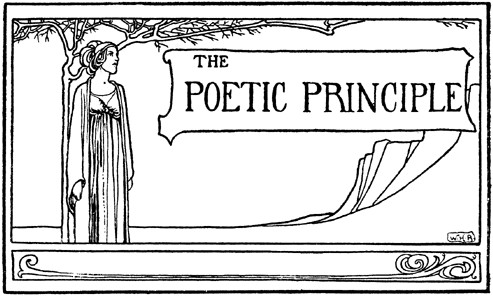
In speaking of the Poetic Principle, I have no design to be either thorough or profound. While discussing very much at random the essentiality of what we call Poetry, my principal purpose will be to cite for consideration some few of those minor English or American poems which best suit my own taste, or which, upon my own fancy, have left the most definite impression. By “minor poems” I mean, of course, poems of little length. And here, in the beginning, permit me to say a few words in regard to a somewhat peculiar principle, which, whether rightfully or wrongfully, has always had its influence in my own critical estimate of the poem. I hold that a long poem does not exist. I maintain that the phrase, “a long poem,” is simply a flat contradiction in terms.
I need scarcely observe that a poem deserves its title only inasmuch as it excites, by elevating the soul. The value of the poem is in the ratio of this elevating excitement. But all excitements are, through a psychal necessity, transient. That degree of excitement which would entitle a poem to be so called at all, cannot be sustained throughout a composition of any great length. After the lapse of half an hour, at the-186- very utmost, it flags—fails—a revulsion ensues—and then the poem is, in effect, and in fact, no longer such.
There are, no doubt, many who have found difficulty in reconciling the critical dictum that the “Paradise Lost” is to be devoutly admired throughout, with the absolute impossibility of maintaining for it, during perusal, the amount of enthusiasm which that critical dictum would demand. This great work, in fact, is to be regarded as poetical only when, losing sight of that vital requisite in all works of Art, Unity, we view it merely as a series of minor poems. If, to preserve its Unity—its totality of effect or impression—we read it (as would be necessary) at a single sitting, the result is but a constant alternation of excitement and depression. After a passage of what we feel to be true poetry, there follows, inevitably, a passage of platitude which no critical pre-judgment can force us to admire; but if, upon completing the work, we read it again; omitting the first book—that is to say, commencing with the second—we shall be surprised at now finding that admirable which we before condemned—that damnable which we had previously so much admired. It follows from all this that the ultimate, aggregate, or absolute effect of even the best epic under the sun, is a nullity—and this is precisely the fact.
In regard to the Iliad, we have, if not positive proof, at least very good reason, for believing it intended as a series of lyrics; but, granting the epic intention, I can say only that the work is based in an imperfect sense of Art. The modern epic is, of the supposititious ancient model, but an inconsiderate and blindfold imitation. But the day of these artistic anomalies is over. If, at any time, any very long poem were popular in reality—which I doubt—it is at least clear that no very long poem will ever be popular again.
That the extent of a poetical work is, ceteris paribus,-187- the measure of its merit, seems undoubtedly, when we thus state it, a proposition sufficiently absurd—yet we are indebted for it to the Quarterly Reviews. Surely there can be nothing in mere size, abstractly considered—there can be nothing in mere bulk, so far as a volume is concerned, which has so continuously elicited admiration from these saturnine pamphlets! A mountain, to be sure, by the mere sentiment of physical magnitude which it conveys, does impress us with a sense of the sublime—but no man is impressed after this fashion by the material grandeur of even “The Columbiad.” Even the Quarterlies have not instructed us to be so impressed by it. As yet, they have not insisted on our estimating Lamartine by the cubic foot, or Pollock by the pound—but what else are we to infer from their continual prating about “sustained effort”? If, by “sustained effort,” any little gentleman has accomplished an epic, let us frankly commend him for the effort—if this indeed be a thing commendable—but let us forbear praising the epic on the effort’s account. It is to be hoped that common sense, in the time to come, will prefer deciding upon a work of Art rather by the impression it makes—by the effect it produces—than by the time it took to impress the effect, or by the amount of “sustained effort” which had been found necessary in effecting the impression. The fact is, that perseverance is one thing and genius quite another—nor can all the Quarterlies in Christendom confound them. By and by, this proposition, with many which I have been just urging, will be received as self-evident. In the meantime, by being generally condemned as falsities, they will not be essentially damaged as truths.
On the other hand, it is clear that a poem may be improperly brief. Undue brevity degenerates into mere epigrammatism. A very short poem, while now and then producing a brilliant or vivid, never pro-188-duces a profound or enduring effect. There must be the steady pressing down of the stamp upon the wax. De Béranger has wrought innumerable things, pungent and spirit-stirring; but in general they have been too imponderous to stamp themselves deeply into the public attention, and thus, as so many feathers of fancy, have been blown aloft only to be whistled down the wind.
A remarkable instance of the effect of undue brevity in depressing a poem—in keeping it out of the popular view—is afforded by the following exquisite little Serenade:
Very few perhaps are familiar with these lines—yet no less a poet than Shelley is their author. Their warm, yet delicate and ethereal imagination will be-189- appreciated by all, but by none so thoroughly as by him who has himself arisen from sweet dreams of one beloved, to bathe in the aromatic air of a southern midsummer night.
One of the finest poems by Willis—the very best in my opinion which he has ever written—has, no doubt, through this same defect of undue brevity, been kept back from its proper position, not less in the critical than in the popular view:
In this composition we find it difficult to recognise the Willis who has written so many mere “verses of society.” The lines are not only richly ideal, but full of energy, while they breathe an earnestness—an evident sincerity of sentiment, for which we look in vain throughout all the other works of this author.
While the epic mania—while the idea that to merit in poetry prolixity is indispensable—has for some years past been gradually dying out of the public mind, by mere dint of its own absurdity—we find it succeeded by a heresy too palpably false to be long tolerated, but one which, in the brief period it has already endured, may be said to have accomplished more in the corruption of our Poetical Literature than all its other enemies combined. I allude to the heresy of The Didactic. It has been assumed, tacitly and avowedly, directly and indirectly, that the ultimate object of all Poetry is Truth. Every poem, it is said, should inculcate a moral, and by this moral is the poetical merit of the work to be adjudged. We Americans especially have patronized this happy idea, and we Bostonians, very especially, have developed it in full. We have taken it into our heads that to write a poem simply for the poem’s sake, and to acknowledge such to have been our design, would be to confess ourselves radically wanting in the true Poetic dignity and force:—but the simple fact is that would we but permit ourselves to look into our own souls, we should immediately there discover that under the sun there neither exists nor can exist any work more thoroughly dignified—more supremely noble, than this very poem—this poem per se—this poem which is a poem and nothing more—this poem written solely for the poem’s sake.
With as deep a reverence for the True as ever inspired the bosom of man, I would nevertheless limit, in some measure, its modes of inculcation. I would limit to enforce them. I would not enfeeble them by dissipa-191-tion. The demands of Truth are severe. She has no sympathy with the myrtles. All that which is so indispensable in Song is precisely all that with which she has nothing whatever to do. It is but making her a flaunting paradox to wreathe her in gems and flowers. In enforcing a truth we need severity rather than efflorescence of language. We must be simple, precise, terse. We must be cool, calm, unimpassioned. In a word, we must be in that mood which, as nearly as possible, is the exact converse of the poetical. He must be blind indeed who does not perceive the radical and chasmal difference between the truthful and the poetical modes of inculcation. He must be theory-mad beyond redemption who, in spite of these differences, shall still persist in attempting to reconcile the obstinate oils and waters of Poetry and Truth.
Dividing the world of mind into its three most immediately obvious distinctions, we have the Pure Intellect, Taste, and the Moral Sense. I place Taste in the middle because it is just this position which, in the mind, it occupies. It holds intimate relations with either extreme; but from the Moral Sense is separated by so faint a difference that Aristotle has not hesitated to place some of its operations among the virtues themselves. Nevertheless we find the offices of the trio marked with a sufficient distinction. Just as the Intellect concerns itself with Truth, so Taste informs us of the Beautiful, while the Moral Sense is regardful of Duty. Of this latter, while Conscience teaches the obligation, and Reason the expediency, Taste contents herself with displaying the charms;—waging war upon Vice solely on the ground of her deformity—her disproportion—her animosity to the fitting, to the appropriate, to the harmonious—in a word, to Beauty.
An immortal instinct deep within the spirit of man is thus, plainly, a sense of the Beautiful. This it is-192- which administers to his delight in the manifold forms, and sounds, and odours, and sentiments amid which he exists. And just as the lily is repeated in the lake, or the eyes of Amaryllis in the mirror, so is the mere oral or written repetition of these forms, and sounds, and colours, and odours, and sentiments a duplicate source of delight. But this mere repetition is not poetry. He who shall simply sing, with however glowing enthusiasm, or with however vivid a truth of description, of the sights, and sounds, and odours, and colours, and sentiments which greet him in common with all mankind—he, I say, has yet failed to prove his divine title. There is still a something in the distance which he has been unable to attain. We have still a thirst unquenchable, to allay which he has not shown us the crystal springs. This thirst belongs to the immortality of Man. It is at once a consequence and an indication of his perennial existence. It is the desire of the moth for the star. It is no mere appreciation of the Beauty before us, but a wild effort to reach the Beauty above. Inspired by an ecstatic prescience of the glories beyond the grave, we struggle by multiform combinations among the things and thoughts of Time to attain a portion of that Loveliness whose very elements perhaps appertain to eternity alone. And thus when by Poetry—or when by Music, the most entrancing of the poetic moods—we find ourselves melted into tears, we weep then, not as the Abbate Gravina supposes, through excess of pleasure, but through a certain petulant, impatient sorrow at our inability to grasp now, wholly, here on earth, at once and for ever, those divine and rapturous joys of which through the poem, or through the music, we attain to but brief and indeterminate glimpses.
The struggle to apprehend the supernal Loveliness—this struggle, on the part of souls fittingly constituted—has given to the world all that which it (the-193- world) has ever been enabled at once to understand and to feel as poetic.
The Poetic Sentiment, of course, may develop itself in various modes—in Painting, in Sculpture, in Architecture, in the Dance—very especially in Music—and very peculiarly, and with a wide field, in the composition of the Landscape Garden. Our present theme, however, has regard only to its manifestation in words. And here let me speak briefly on the topic of rhythm. Contenting myself with the certainty that Music, in its various modes of metre, rhythm, and rhyme, is of so vast a moment in Poetry as never to be wisely rejected—is so vitally important an adjunct, that he is simply silly who declines its assistance, I will not now pause to maintain its absolute essentiality. It is in Music perhaps that the soul most nearly attains the great end for which, when inspired by the Poetic Sentiment, it struggles—the creation of supernal Beauty. It may be, indeed, that here this sublime end is, now and then, attained in fact. We are often made to feel, with a shivering delight, that from an earthly harp are stricken notes which cannot have been unfamiliar to the angels. And thus there can be little doubt that in the union of Poetry with Music in its popular sense, we shall find the widest field for the Poetic development. The old Bards and Minnesingers had advantages which we do not possess—and Thomas Moore, singing his own songs, was, in the most legitimate manner, perfecting them as poems.
To recapitulate then:—I would define, in brief, the Poetry of words as The Rhythmical Creation of Beauty. Its sole arbiter is Taste. With the Intellect or with the Conscience it has only collateral relations. Unless incidentally, it has no concern whatever either with Duty or with Truth.
A few words, however, in explanation. That pleasure which is at once the most pure, the most elevating,-194- and the most intense, is derived, I maintain, from the contemplation of the Beautiful. In the contemplation of Beauty we alone find it possible to attain that pleasurable elevation, or excitement of the soul, which we recognise as the Poetic Sentiment, and which is so easily distinguished from Truth, which is the satisfaction of the Reason, or from Passion, which is the excitement of the heart. I make Beauty, therefore—using the word as inclusive of the sublime—I make Beauty the province of the poem, simply because it is an obvious rule of Art that effects should be made to spring as directly as possible from their causes:—no one as yet having been weak enough to deny that the peculiar elevation in question is at least most readily attainable in the poem. It by no means follows, however, that the incitements of Passion, or the Precepts of Duty, or even the lessons of Truth, may not be introduced into a poem, and with advantage; for they may subserve incidentally, in various ways, the general purposes of the work: but the true artist will always contrive to tone them down in proper subjection to that Beauty which is the atmosphere and the real essence of the poem.
I cannot better introduce the few poems which I shall present for your consideration, than by the citation of the Proem to Longellow’s “Waif”:
With no great range of imagination, these lines have been justly admired for their delicacy of expression. Some of the images are very effective. Nothing can be better than—
The idea of the last quatrain is also very effective. The poem on the whole, however, is chiefly to be admired for the graceful insouciance of its metre, so well in accordance with the character of the sentiments, and especially for the ease of the general manner. This “ease” or naturalness, in a literary style, it has long been the fashion to regard as ease in appearance alone—as a point of really difficult attainment. But not so: a natural manner is difficult only to him who should never meddle with it—to the unnatural. It is but the result of writing with the understanding, or with the instinct, that the tone, in composition, should always be that which the mass of mankind would adopt—and must perpetually vary, of course, with the occasion. The author who, after the fashion of The North American Review, should be upon all occasions merely “quiet,” must necessarily upon many occasions be simply silly, or stupid; and has no more right to be considered “easy” or “natural” than a Cockney exquisite, or than the sleeping Beauty in the wax-works.
Among the minor poems of Bryant, none has so much impressed me as the one which he entitles “June.” I quote only a portion of it:
The rhythmical flow here is even voluptuous—nothing could be more melodious. The poem has always affected me in a remarkable manner. The intense melancholy which seems to well up, perforce, to the surface of all the poet’s cheerful sayings about his grave, we find thrilling us to the soul—while there is the truest poetic elevation in the thrill. The impression left is one of a pleasurable sadness. And if, in the remaining compositions which I shall introduce to you, there be more or less of a similar tone always apparent, let me remind you that (how or why we know not) this certain taint of sadness is inseparably connected with all the higher manifestations of true Beauty. It is, nevertheless,
The taint of which I speak is clearly perceptible even in a poem so full of brilliancy and spirit as “The Health” of Edward Coote Pinkney:
It was the misfortune of Mr. Pinkney to have been born too far south. Had he been a New Englander, it is probable that he would have been ranked as the first of American lyrists by that magnanimous cabal which has so long controlled the destinies of American Letters, in conducting the thing called The North American Review. The poem just cited is especially beautiful; but the poetic elevation which it induces we must refer chiefly to our sympathy in the poet’s enthusiasm. We pardon his hyperboles for the evident earnestness with which they are uttered.
It was by no means my design, however, to expatiate upon the merits of what I should read you. These will necessarily speak for themselves. Boccalini, in his “Advertisements from Parnassus,” tells us that Zoilus once presented Apollo a very caustic criticism upon a very admirable book:—whereupon the god asked him for the beauties of the work. He replied that he only busied himself about the errors. On hearing this, Apollo, handing him a sack of unwinnowed wheat, bade him pick out all the chaff for his reward.
Now this fable answers very well as a hit at the critics—but I am by no means sure that the god was in the right. I am by no means certain that the true limits of the critical duty are not grossly misunderstood. Excellence, in a poem especially, may be considered in the light of an axiom, which need only be properly put, to become self-evident. It is not excellence if it require to be demonstrated as such:—and thus to point out too particularly the merits of a work of Art, is to admit that they are not merits altogether.
Among the “Melodies” of Thomas Moore is one-200- whose distinguished character as a poem proper seems to have been singularly left out of view. I allude to his lines beginning—“Come, rest in this bosom.” The intense energy of their expression is not surpassed by anything in Byron. There are two of the lines in which a sentiment is conveyed that embodies the all in all of the divine passion of Love—a sentiment which, perhaps, has found its echo in more, and in more passionate, human hearts than any other single sentiment ever embodied in words:
It has been the fashion of late days to deny Moore Imagination, while granting him Fancy—a distinction originating with Coleridge—than whom no man more fully comprehended the great powers of Moore. The fact is, that the fancy of this poet so far predominates over all his other faculties, and over the fancy of all other men, as to have induced, very naturally, the idea that he is fanciful only. But never was there a greater mistake. Never was a grosser wrong done the fame of a true poet. In the compass of the English language I can call to mind no poem more profoundly—more weirdly imaginative, in the best sense, than the lines commencing—“I would I were by that dim lake”—which are the composition of-201- Thomas Moore. I regret that I am unable to remember them.
One of the noblest—and, speaking of Fancy—one of the most singularly fanciful of modern poets, was Thomas Hood. His “Fair Ines” had always for me an inexpressible charm:
“The Haunted House,” by the same author, is one of the truest poems ever written,—one of the truest, one of the most unexceptionable, one of the most thoroughly artistic, both in its theme and in its execution. It is, moreover, powerfully ideal—imaginative. I regret that its length renders it unsuitable for the purposes of this lecture. In place of it permit me to offer the universally appreciated “Bridge of Sighs”:
The vigour of this poem is no less remarkable than its pathos. The versification, although carrying the fanciful to the very verge of the fantastic, is nevertheless admirably adapted to the wild insanity which is the thesis of the poem.
Among the minor poems of Lord Byron is one which has never received from the critics the praise which it undoubtedly deserves:
Although the rhythm here is one of the most difficult, the versification could scarcely be improved. No nobler theme ever engaged the pen of poet. It is the soul-elevating idea that no man can consider himself entitled to complain of Fate while in his adversity he still retains the unwavering love of woman.
From Alfred Tennyson—although in perfect sincerity I regard him as the noblest poet that ever lived—I have left myself time to cite only a very brief specimen. I call him, and think him the noblest of poets, not because the impressions he produces are at all times the most profound—not because the poetical excitement which he induces is at all times the most intense—but because it is at all times the most ethereal—in other words, the most elevating and most pure. No poet is so little of the earth, earthy.-207- What I am about to read is from his last long poem, “The Princess”:
Thus, although in a very cursory and imperfect manner, I have endeavoured to convey to you my conception of the Poetic Principle. It has been my purpose to suggest that, while this Principle itself is, strictly and simply, the Human Aspiration for Supernal Beauty, the manifestation of the Principle is always found in an elevating excitement of the soul—quite independent of that passion which is the intoxication of the Heart, or of that truth which is the satisfaction of the Reason. For in regard to Passion, alas! its tendency is to degrade rather than to elevate the Soul. Love, on the contrary—Love—the true, the divine Eros—the Uranian as distinguished from the Dionæan Venus—is unquestionably the purest and truest of all poetical themes. And in-208- regard to Truth, if, to be sure, through the attainment of a truth we are led to perceive a harmony where none was apparent before, we experience at once the true poetical effect; but this effect is referable to the harmony alone, and not in the least degree to the truth which merely served to render the harmony manifest.
We shall reach, however, more immediately a distinct conception of what the true Poetry is, by mere reference to a few of the simple elements which induce in the Poet himself the true poetical effect. He recognizes the ambrosia which nourishes his soul in the bright orbs that shine in Heaven, in the volutes of the flower, in the clustering of low shrubberies, in the waving of the grain-fields, in the slanting of tall eastern trees, in the blue distance of mountains, in the grouping of clouds, in the twinkling of half-hidden brooks, in the gleaming of silver rivers, in the repose of sequestered lakes, in the star-mirroring depths of lonely wells. He perceives it in the songs of birds, in the harp of Æolus, in the sighing of the night-wind, in the repining voice of the forest, in the surf that complains to the shore, in the fresh breath of the woods, in the scent of the violet, in the voluptuous perfume of the hyacinth, in the suggestive odour that comes to him at eventide from far-distant undiscovered islands, over dim oceans, illimitable and unexplored. He owns it in all noble thoughts, in all unworldly motives, in all holy impulses, in all chivalrous, generous, and self-sacrificing deeds. He feels it in the beauty of woman, in the grace of her step, in the lustre of her eye, in the melody of her voice, in her soft laughter, in her sigh, in the harmony of the rustling of her robes. He deeply feels it in her winning endearments, in her burning enthusiasms, in her gentle charities, in her meek and devotional endurances, but above all—ah, far above all—he kneels to-209- it, he worships it in the faith, in the purity, in the strength, in the altogether divine majesty of her love.
Let me conclude by the recitation of yet another brief poem, one very different in character from any that I have before quoted. It is by Motherwell, and is called “The Song of the Cavalier.” With our modern and altogether rational ideas of the absurdity and impiety of warfare, we are not precisely in that frame of mind best adapted to sympathise with the sentiments, and thus to appreciate the real excellence of the poem. To do this fully we must identify ourselves in fancy with the soul of the old cavalier:

Charles Dickens, in a note now lying before me, alluding to an examination I once made of the mechanism of “Barnaby Rudge,” says—“By the way, are you aware that Godwin wrote his ‘Caleb Williams’ backwards? He first involved his hero in a web of difficulties, forming the second volume, and then, for the first, cast about him for some mode of accounting for what had been done.”
I cannot think this the precise mode of procedure on the part of Godwin—and indeed what he himself acknowledges is not altogether in accordance with Mr. Dickens’s idea—but the author of “Caleb Williams” was too good an artist not to perceive the advantage derivable from at least a somewhat similar process. Nothing is more clear than that every plot, worth the name, must be elaborated to its dénouement before anything be attempted with the pen. It is only with the dénouement constantly in view that we can give a plot its indispensable air of consequence, or causation, by making the incidents, and especially the tone at all points, tend to the development of the intention.
There is a radical error, I think, in the usual mode of constructing a story. Either history affords a thesis—or one is suggested by an incident of the day—or, at best, the author sets himself to work in the combination of striking events to form merely the basis of his narrative—designing, generally, to fill in with description, dialogue, or autorial comment, whatever crevices of fact or action may, from page to page, render themselves apparent.-212-
I prefer commencing with the consideration of an effect. Keeping originality always in view—for he is false to himself who ventures to dispense with so obvious and so easily attainable a source of interest—I say to myself, in the first place, “Of the innumerable effects or impressions of which the heart, the intellect, or (more generally) the soul is susceptible, what one shall I, on the present occasion, select?” Having chosen a novel first, and secondly, a vivid effect, I consider whether it can be best wrought by incident or tone—whether by ordinary incidents and peculiar tone, or the converse, or by peculiarity both of incident and tone—afterwards looking about me (or rather within) for such combinations of event or tone as shall best aid me in the construction of the effect.
I have often thought how interesting a magazine paper might be written by any author who would—that is to say, who could—detail, step by step, the processes by which any one of his compositions attained its ultimate point of completion. Why such a paper has never been given to the world, I am much at a loss to say—but perhaps the autorial vanity has had more to do with the omission than any one other cause. Most writers—poets in especial—prefer having it understood that they compose by a species of fine frenzy—an ecstatic intuition-and would positively shudder at letting the public take a peep behind the scenes, at the elaborate and vacillating crudities of thought—at the true purposes seized only at the last moment—at the innumerable glimpses of idea that arrived not at the maturity of full view—at the fully-matured fancies discarded in despair as unmanageable—at the cautious selections and rejections—at the painful erasures and interpolations—in a word, at the wheels and pinions, the tackle for scene-shifting, the step-ladders and demon-traps, the cock’s feathers, the red paint, and the black patches, which, in ninety-nine-213- cases out of the hundred, constitute the properties of the literary histrio.
I am aware, on the other hand, that the case is by no means common, in which an author is at all in condition to retrace the steps by which his conclusions have been attained. In general, suggestions, having arisen pell-mell, are pursued and forgotten in a similar manner.
For my own part, I have neither sympathy with the repugnance alluded to, nor, at any time, the least difficulty in recalling to mind the progressive steps of any of my compositions; and, since the interest of an analysis, or reconstruction, such as I have considered a desideratum, is quite independent of any real or fancied interest in the thing analysed, it will not be regarded as a breach of decorum on my part to show the modus operandi by which some one of my own works was put together. I select “The Raven” as most generally known. It is my design to render it manifest that no one point in its composition is referable either to accident or intuition—that the work proceeded, step by step, to its completion with the precision and rigid consequence of a mathematical problem.
Let us dismiss, as irrelevant to the poem, per se, the circumstance—or say the necessity—which, in the first place, gave rise to the intention of composing a poem that should suit at once the popular and the critical taste.
We commence, then, with this intention.
The initial consideration was that of extent. If any literary work is too long to be read at one sitting, we must be content to dispense with the immensely important effect derivable from unity of impression—for, if two sittings be required, the affairs of the world interfere, and everything like totality is at once destroyed. But since, ceteris paribus, no poet can afford-214- to dispense with anything that may advance his design, it but remains to be seen whether there is, in extent, any advantage to counterbalance the loss of unity which attends it. Here I say no, at once. What we term a long poem is, in fact, merely a succession of brief ones—that is to say, of brief poetical effects. It is needless to demonstrate that a poem is such only inasmuch as it intensely excites, by elevating the soul; and all intense excitements are, through a psychal necessity, brief. For this reason, at least one-half of the “Paradise Lost” is essentially prose—a succession of poetical excitements interspersed, inevitably, with corresponding depressions—the whole being deprived, through the extremeness of its length, of the vastly important artistic element, totality, or unity of effect.
It appears evident, then, that there is a distinct limit, as regards length, to all works of literary art—the limit of a single sitting—and that, although in certain classes of prose composition, such as “Robinson Crusoe” (demanding no unity), this limit may be advantageously overpassed, it can never properly be overpassed in a poem. Within this limit, the extent of a poem may be made to bear mathematical relation to its merit—in other words, to the excitement or elevation—again, in other words, to the degree of the true poetical effect which it is capable of inducing; for it is clear that the brevity must be in direct ratio of the intensity of the intended effect—this, with one proviso—that a certain degree of duration is absolutely requisite for the production of any effect at all.
Holding in view these considerations, as well as that degree of excitement which I deemed not above the popular, while not below the critical taste, I reached at once what I conceived the proper length for my intended poem—a length of about one hundred lines. It is, in fact, a hundred and eight.
My next thought concerned the choice of an im-215-pression, or effect, to be conveyed: and here I may as well observe that, throughout the construction, I kept steadily in view the design of rendering the work universally appreciable. I should be carried too far out of my immediate topic were I to demonstrate a point upon which I have repeatedly insisted, and which, with the poetical, stands not in the slightest need of demonstration—the point, I mean, that Beauty is the sole legitimate province of the poem. A few words, however, in elucidation of my real meaning, which some of my friends have evinced a disposition to misrepresent. That pleasure which is at once the most intense, the most elevating, and the most pure, is, I believe, found in the contemplation of the beautiful. When, indeed, men speak of Beauty, they mean, precisely, not a quality, as is supposed, but an effect—they refer, in short, just to that intense and pure elevation of soul—not of intellect, or of heart—upon which I have commented, and which is experienced in consequence of contemplating “the beautiful.” Now I designate Beauty as the province of the poem, merely because it is an obvious rule of Art that effects should be made to spring from direct causes—that objects should be attained through means best adapted for their attainment—no one as yet having been weak enough to deny that the peculiar elevation alluded to, is most readily attained in the poem. Now the object Truth, or the satisfaction of the intellect, and the object Passion, or the excitement of the heart, are, although attainable to a certain extent in poetry, far more readily attainable in prose. Truth, in fact, demands a precision, and Passion a homeliness (the truly passionate will comprehend me) which are absolutely antagonistic to that Beauty which, I maintain, is the excitement, or pleasurable elevation, of the soul. It by no means follows from anything here said that passion, or even truth, may not be introduced, or even-216- profitably introduced, into a poem—for they may serve in elucidation, or aid the general effect, as do discords in music, by contrast—but the true artist will always contrive, first, to tone them into proper subservience to the predominant aim, and, secondly, to enveil them, as far as possible, in that Beauty which is the atmosphere and the essence of the poem.
Regarding, then, Beauty as my province, my next question referred to the tone of its highest manifestation—and all experience has shown that this tone is one of sadness. Beauty of whatever kind, in its supreme development, invariably excites the sensitive soul to tears. Melancholy is thus the most legitimate of all the poetical tones.
The length, the province, and the tone being thus determined, I betook myself to ordinary induction, with the view of obtaining some artistic piquancy which might serve me as a key-note in the construction of the poem—some pivot upon which the whole structure might turn. In carefully thinking over all the usual artistic effects—or more properly points, in the theatrical sense—I did not fail to perceive immediately that no one had been so universally employed as that of the refrain. The universality of its employment sufficed to assure me of its intrinsic value, and spared me the necessity of submitting it to analysis. I considered it, however, with regard to its susceptibility of improvement, and soon saw it to be in a primitive condition. As commonly used, the refrain, or burden, not only is limited to lyric verse, but depends for its impression upon the force of monotone—both in sound and thought. The pleasure is deduced solely from the sense of identity—of repetition. I resolved to diversify, and so heighten the effect, by adhering in general to the monotone of sound, while I continually varied that of thought: that is to say, I determined to produce continuously-217- novel effects, by the variation of the application of the refrain—the refrain itself remaining, for the most part, unvaried.
These points being settled, I next bethought me of the nature of my refrain. Since its application was to be repeatedly varied, it was clear that the refrain itself must be brief, for there would have been an insurmountable difficulty in frequent variations of application in any sentence of length. In proportion to the brevity of the sentence would of course be the facility of the variation. This led me at once to a single word as the best refrain.
The question now arose as to the character of the word. Having made up my mind to a refrain, the division of the poem into stanzas was of course a corollary, the refrain forming the close to each stanza. That such a close, to have force, must be sonorous and susceptible of protracted emphasis, admitted no doubt, and these considerations inevitably led me to the long o as the most sonorous vowel in connection with r as the most producible consonant.
The sound of the refrain being thus determined, it became necessary to select a word embodying this sound, and at the same time in the fullest possible keeping with that melancholy which I had predetermined as the tone of the poem. In such a search it would have been absolutely impossible to overlook the word “Nevermore.” In fact, it was the very first which presented itself.
The next desideratum was a pretext for the continuous use of the one word “Nevermore.” In observing the difficulty which I at once found in inventing a sufficiently plausible reason for its continuous repetition, I did not fail to perceive that this difficulty arose solely from the pre-assumption that the word was to be so continuously or monotonously spoken by a human being—I did not fail to perceive,-218- in short, that the difficulty lay in the reconciliation of this monotony with the exercise of reason on the part of the creature repeating the word. Here, then, immediately arose the idea of a non-reasoning creature capable of speech; and very naturally, a parrot, in the first instance, suggested itself, but was superseded forthwith by a Raven as equally capable of speech, and infinitely more in keeping with the intended tone.
I had now gone so far as the conception of a Raven, the bird of ill-omen, monotonously repeating the one word “Nevermore” at the conclusion of each stanza in a poem of melancholy tone, and in length about one hundred lines. Now, never losing sight of the object supremeness, or perfection at all points, I asked myself—“Of all melancholy topics what, according to the universal understanding of mankind, is the most melancholy?” Death, was the obvious reply. “And when,” I said, “is this most melancholy of topics most poetical?” From what I have already explained at some length, the answer here also is obvious—“When it most closely allies itself to Beauty: the death, then, of a beautiful woman is unquestionably the most poetical topic in the world, and equally is it beyond doubt that the lips best suited for such topic are those of a bereaved lover.”
I had now to combine the two ideas of a lover lamenting his deceased mistress and a Raven continuously repeating the word “Nevermore.” I had to combine these, bearing in mind my design of varying at every turn the application of the word repeated, but the only intelligible mode of such combination is that of imagining the Raven employing the word in answer to the queries of the lover. And here it was that I saw at once the opportunity afforded for the effect on which I had been depending, that is to say, the effect of the variation of application. I saw that I could make the first query propounded by the lover—the-219- first query to which the Raven should reply “Nevermore”—that I could make this first query a commonplace one, the second less so, the third still less, and so on, until at length the lover, startled from his original nonchalance by the melancholy character of the word itself, by its frequent repetition, and by a consideration of the ominous reputation of the fowl that uttered it, is at length excited to superstition, and wildly propounds queries of a far different character—queries whose solution he has passionately at heart—propounds them half in superstition and half in that species of despair which delights in self-torture—propounds them not altogether because he believes in the prophetic or demoniac character of the bird (which reason assures him is merely repeating a lesson learned by rote), but because he experiences a frenzied pleasure in so modelling his questions as to receive from the expected “Nevermore” the most delicious because the most intolerable of sorrow. Perceiving the opportunity thus afforded me, or, more strictly, thus forced upon me in the progress of the construction, I first established in mind the climax or concluding query—that query to which “Nevermore” should be in the last place an answer—that query in reply to which this word “Nevermore” should involve the utmost conceivable amount of sorrow and despair.
Here then the poem may be said to have its beginning, at the end where all works of art should begin; for it was here, at this point of my preconsiderations, that I first put pen to paper in the composition of the stanza:
I composed this stanza, at this point, first that, by establishing the climax, I might the better vary and graduate, as regards seriousness and importance, the preceding queries of the lover, and secondly, that I might definitely settle the rhythm, the metre, and the length and general arrangement of the stanza, as well as graduate the stanzas which were to precede, so that none of them might surpass this in rhythmical effect. Had I been able in the subsequent composition to construct more vigorous stanzas, I should without scruple have purposely enfeebled them so as not to interfere with the climacteric effect.
And here I may as well say a few words of the versification. My first object (as usual) was originality. The extent to which this has been neglected in versification is one of the most unaccountable things in the world. Admitting that there is little possibility of variety in mere rhythm, it is still clear that the possible varieties of metre and stanza are absolutely infinite; and yet, for centuries, no man, in verse, has ever done, or ever seemed to think of doing, an original thing. The fact is that originality (unless in minds of very unusual force) is by no means a matter, as some suppose, of impulse or intuition. In general, to be found, it must be elaborately sought, and, although a positive merit of the highest class, demands in its attainment less of invention than negation.
Of course I pretend to no originality in either the rhythm or metre of the “Raven.” The former is trochaic—the latter is octameter acatalectic, alternating with heptameter catalectic repeated in the refrain of the fifth verse, and terminating with tetrameter catalectic. Less pedantically, the feet employed throughout (trochees) consist of a long syllable followed by a short; the first line of the stanza consists of eight of these feet, the second of seven and a half (in effect two-thirds), the third of eight, the fourth of seven and a-221- half, the fifth the same, the sixth three and a half. Now, each of these lines taken individually has been employed before, and what originality the “Raven” has, is in their combination into stanza; nothing even remotely approaching this combination has ever been attempted. The effect of this originality of combination is aided by other unusual and some altogether novel effects, arising from an extension of the application of the principles of rhyme and alliteration.
The next point to be considered was the mode of bringing together the lover and the Raven—and the first branch of this consideration was the locale. For this the most natural suggestion might seem to be a forest, or the fields—but it has always appeared to me that a close circumscription of space is absolutely necessary to the effect of insulated incident—it has the force of a frame to a picture. It has an indisputable moral power in keeping concentrated the attention, and, of course, must not be confounded with mere unity of place.
I determined, then, to place the lover in his chamber—in a chamber rendered sacred to him by memories of her who had frequented it. The room is represented as richly furnished—this in mere pursuance of the ideas I have already explained on the subject of Beauty, as the sole true poetical thesis.
The locale being thus determined, I had now to introduce the bird—and the thought of introducing him through the window was inevitable. The idea of making the lover suppose, in the first instance, that the flapping of the wings of the bird against the shutter, is a “tapping” at the door, originated in a wish to increase, by prolonging, the reader’s curiosity, and in a desire to admit the incidental effect arising from the lover’s throwing open the door, finding all dark, and thence adopting the half-fancy that it was the spirit of his mistress that knocked.-222-
I made the night tempestuous, first to account for the Raven’s seeking admission, and secondly, for the effect of contrast with the (physical) serenity within the chamber.
I made the bird alight on the bust of Pallas, also for the effect of contrast between the marble and the plumage—it being understood that the bust was absolutely suggested by the bird—the bust of Pallas being chosen, first, as most in keeping with the scholarship of the lover, and, secondly, for the sonorousness of the word, Pallas, itself.
About the middle of the poem, also, I have availed myself of the force of contrast, with a view of deepening the ultimate impression. For example, an air of the fantastic—approaching as nearly to the ludicrous as was admissible—is given to the Raven’s entrance. He comes in “with many a flirt and flutter.”
In the two stanzas which follow, the design is more obviously carried out:
The effect of the dénouement being thus provided for, I immediately drop the fantastic for a tone of the most profound seriousness—this tone commencing in the stanza directly following the one last quoted, with the line,
But the Raven, sitting lonely on that placid bust, spoke only, etc.
From this epoch the lover no longer jests—no longer sees anything even of the fantastic in the Raven’s demeanour. He speaks of him as a “grim, ungainly, ghastly, gaunt, and ominous bird of yore,” and feels the “fiery eyes” burning into his “bosom’s core.” This revolution of thought, or fancy, on the lover’s part, is intended to induce a similar one on the part of the reader—to bring the mind into a proper frame for the dénouement—which is now brought about as rapidly and as directly as possible.
With the dénouement proper—with the Raven’s reply, “Nevermore,” to the lover’s final demand if he shall meet his mistress in another world—the poem, in its obvious phase, that of a simple narrative, may be said to have its completion. So far, everything is within the limits of the accountable—of the real. A raven, having learned by rote the single word “Nevermore,” and having escaped from the custody of its owner, is driven at midnight, through the violence of a storm, to seek admission at a window from which a light still gleams—the chamber-window of a student, occupied half in poring over a volume, half in dreaming of a beloved mistress deceased. The casement being thrown open at the fluttering of the bird’s wings, the bird itself perches on the most convenient seat out of the immediate reach of the student, who, amused by the incident and the oddity of the visitor’s demeanour, demands of it, in jest and without looking for a reply, its name. The Raven addressed, answers with its customary word, “Nevermore”—a word which-224- finds immediate echo in the melancholy heart of the student, who, giving utterance aloud to certain thoughts suggested by the occasion, is again startled by the fowl’s repetition of “Nevermore.” The student now guesses the state of the case, but is impelled, as I have before explained, by the human thirst for self-torture, and in part by superstition, to propound such queries to the bird as will bring him, the lover, the most of the luxury of sorrow, through the anticipated answer “Nevermore.” With the indulgence, to the extreme, of this self-torture, the narration, in what I have termed its first or obvious phase, has a natural termination, and so far there has been no overstepping of the limits of the real.
But in subjects so handled, however skilfully, or with however vivid an array of incident, there is always a certain hardness or nakedness which repels the artistical eye. Two things are invariably required—first, some amount of complexity, or more properly, adaptation; and, secondly, some amount of suggestiveness—some undercurrent, however indefinite, of meaning. It is this latter, in especial, which imparts to a work of art so much of that richness (to borrow from colloquy a forcible term) which we are too fond of confounding with the ideal. It is the excess of the suggested meaning—it is the rendering this the upper instead of the under current of theme—which turns into prose (and that of the very flattest kind) the so-called poetry of the so-called transcendentalists.
Holding these opinions, I added the two concluding stanzas of the poem—their suggestiveness being thus made to pervade all the narrative which has preceded them. The undercurrent of meaning is rendered first apparent in the lines—
It will be observed that the words, “from out my heart,” involve the first metaphorical expression in the poem. They, with the answer, “Nevermore,” dispose the mind to seek a moral in all that has been previously narrated. The reader begins now to regard the Raven as emblematical—but it is not until the very last line of the very last stanza, that the intention of making him emblematical of Mournful and never-ending Remembrance is permitted distinctly to be seen:
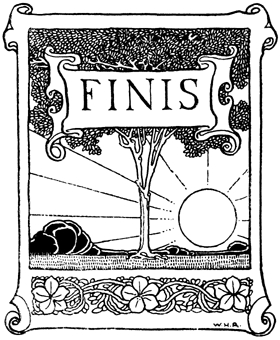

CHISWICK PRESS: CHARLES WHITTINGHAM AND CO.
TOOKS COURT, CHANCERY LANE, LONDON.
Full-page images have been moved to the nearest paragraph break in order to maintain the flow of the text. Page number errors in the Contents and the List of Illustrations have been corrected without note.